May 30, 2023
UNESCO mobilizes Education Ministers Worldwide for a Coordinated Response to Artificial Intelligence.
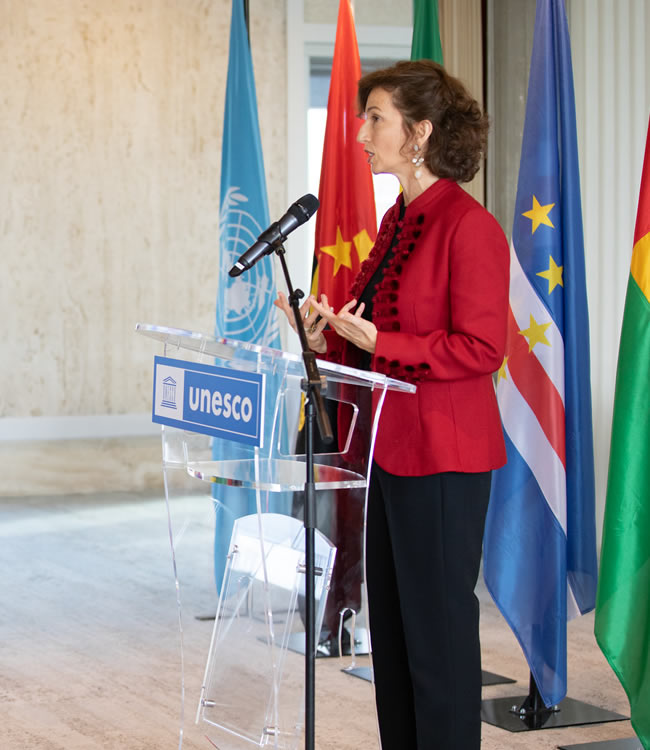
Photo: Unesco Director-General Audrey Azoulay addresses an event at Unesco Headquarters in Paris. May 09, 2023. Image provided by & copyright © UNESCO/Christelle ALIX.
Paris, France, May 30, 2023 — In response to the rapid emergence of new and powerful generative AI tools, UNESCO convened the first global gathering of Education Ministers to discuss the immediate and long-term potential, difficulties and hazards AI applications pose to education systems. Over 40 Ministers gathered to exchange policy approaches and plans for integrating these tools into education. UNESCO proposed a roadmap on generative AI and education, including open multistakeholder collaboration, during the online discussion on May 25, 2023.
“Generative AI expands educational horizons and challenges.” However, we must act quickly to ensure that future AI technologies are integrated into education on our terms. “It is our responsibility to prioritize safety, inclusion, diversity, transparency, and quality — as stated in the UNESCO Recommendation on the Ethics of Artificial Intelligence, which our Member States unanimously adopted,” said Stefania Giannini, UNESCO Assistant Director-General for Education.
• Ministers highlighted several Pressing Challenges and shared Policy Approaches
Several common concerns emerged during the discussion, including how to adapt education systems to the disruptions that generative AI is causing, how to integrate generative AI into curricula, teaching methods, and examinations, and how to mitigate the inherent flaws of these technologies, such as the ability to make glaring errors and produce biassed information.
The ministerial debate highlighted that governments worldwide are building or refining appropriate policy responses in this fast-emerging context, including developing or refining national AI, data protection, and other regulatory frameworks.
• Only 10% of Schools and Universities have Formal Guidance on AI
According to a new UNESCO global study of over 450 schools and institutions, less than 10% have produced institutional rules and detailed advice on using generative AI applications. The findings show that institutions face difficulties in responding quickly to the sudden appearance of these powerful, productive AI apps capable of producing written and visual creations.
The importance of teachers as learning facilitators in this new era was emphasized. However, to handle these obstacles, teachers require guidance and training.
• UNESCO’s Policy Guidelines and Competencies Framework
UNESCO will continue to lead the global conversation with policymakers, EdTech partners, academia, and civil society. The Organisation is establishing policy guidelines for using generative AI in education and research and AI competency frameworks for students and teachers in school. These will be unveiled at the Digital Learning Week, held at the UNESCO Headquarters in Paris from September 4 to 7, 2023.
Through its mandates for education and science, UNESCO has unique competence. In recent years, the Organisation has led a global study on the Future of Education, and it has also produced the first global normative framework for the ethics of artificial intelligence, which its 193 Member States unanimously endorsed in November 2021.
• UNESCO’s Work in AI in Education
UNESCO is aiding its Member States in realizing the potential of AI technology in their respective fields of competence. The UNESCO Recommendation on the Ethics of AI, adopted in 2021, establishes the proper normative foundation. In education, the Organisation has mobilized stakeholders around the Beijing Consensus on Artificial Intelligence and Education and has produced several guidelines, including AI and Education: A Guide for Policymakers.
Source: UNESCO
|GlobalGiants.Com|
— The Editor is a UNESCO-IIEP Certified Higher Education Consultant.







Edited & Posted by the Editor | 3:18 AM | View the original post
May 21, 2023
United Nations Secretary-General Visits Hiroshima Peace Memorial ParkÂ
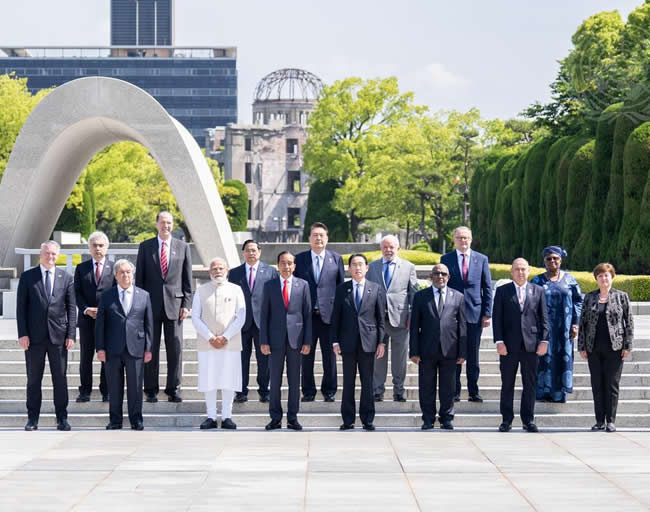
Photo: UN Secretary-General António Guterres (front row, second from left) visits the Hiroshima Peace Memorial Park. Prime Minister Modi of India and the IMF Managing Director Kristalina Georgieva (extreme right) are also in the picture. The UN Secretary-General will attend the Group of Seven (G7) Summit in Hiroshima, Japan. May 21, 2023. Japan. UN Photo/Ichiro Mae.
Source: United Nations, New York
|GlobalGiants.Com|







Edited & Posted by the Editor | 11:03 AM | View the original post
May 20, 2023
Prime Minister Modi of India Unveils Mahatma Gandhi Bust in Hiroshima
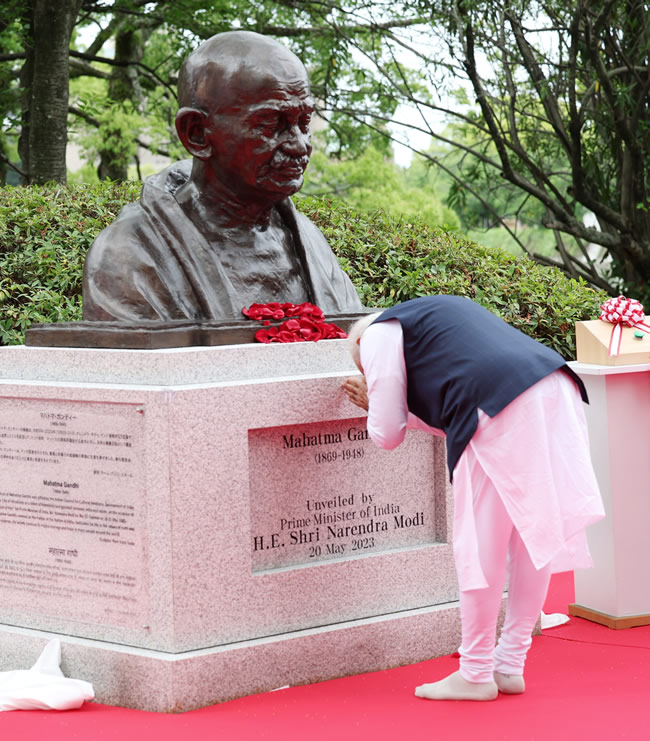
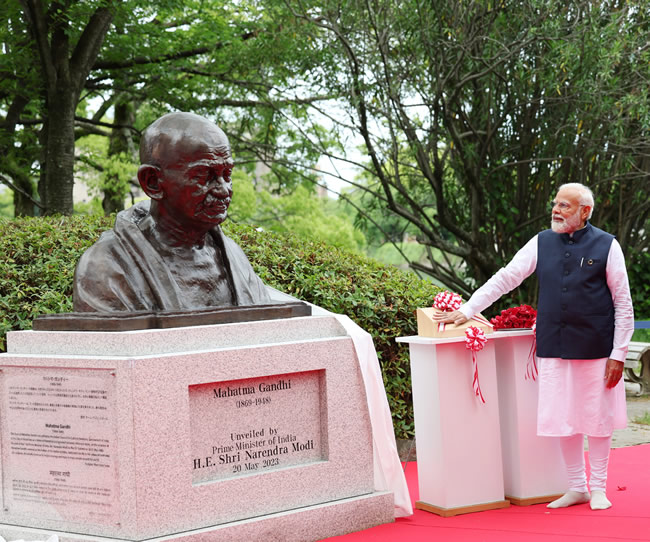
Photos: Prime Minister Narendra Modi of India unveils the bust of Mahatma Gandhi in Hiroshima, Japan, on May 20, 2023.
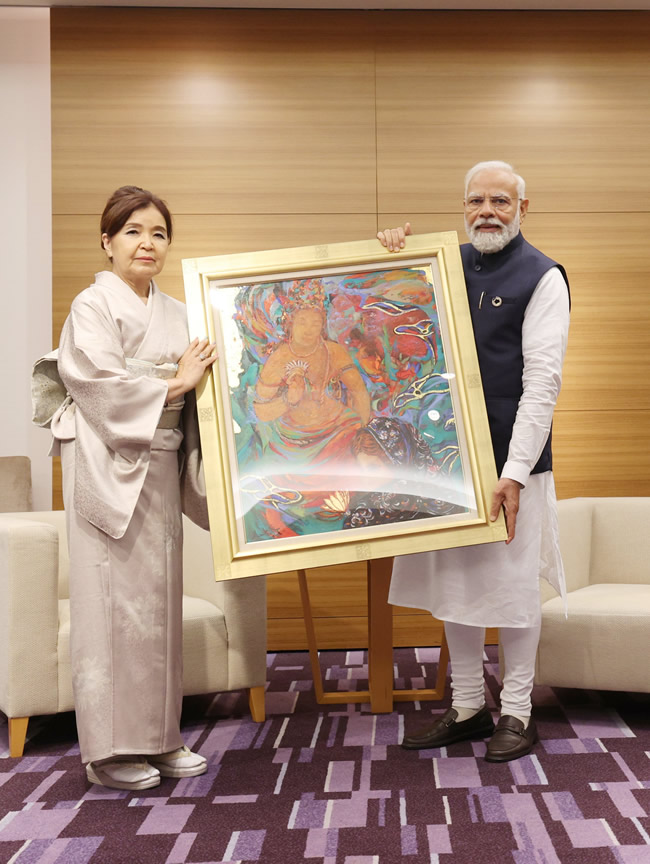
Photo: Prime Minister Narendra Modi of India meets Japanese painter Ms. Hiroko Takayama at Hiroshima, Japan, on May 20, 2023.
Hiroshima, Japan, May 20, 2023 —Prime Minister Narendra Modi of India today unveiled the bust of Mahatma Gandhi in Hiroshima, Japan.
Dignitaries present during the unveiling ceremony included H.E Mr. Nakatani Gen, Special Advisor to the Prime Minister of Japan and Member of Parliament; Mr. Kazumi Matsui, Mayor of Hiroshima City; Mr. Tatsunori Motani, Speaker of the Hiroshima City Assembly; Members of Parliament from Hiroshima and senior government officials; members of the Indian community; and followers of Mahatma Gandhi in Japan.
The Mahatma Gandhi bust has been gifted by the Government of India to the city of Hiroshima as a symbol of friendship and goodwill between India and Japan on the occasion of the visit of the Prime Minister for the G-7 summit from 19-21 May 2023.
Padma Bhushan awardee Shri Ram Vanji Sutar has sculpted the 42 inches tall bronze bust. The bust site, adjacent to the Motoyasu River, is close to the iconic A-Bomb Dome that thousands of locals and tourists visit daily.
The location has been chosen as a mark of solidarity for peace and non-violence. Mahatma Gandhi dedicated his life to peace and non-violence. Therefore, the location truly resonates with the principles and life of Gandhiji, which continues to inspire the world and its leaders.
Source: Prime Minister’s Office, New Delhi
|GlobalGiants.Com|
#WATCH | Prime Minister #NarendraModi unveils a bust of #MahatmaGandhi in #Hiroshima, #Japan.#G7HiroshimaSummit
— Hindustan Times (@htTweets) May 20, 2023
(ANI) pic.twitter.com/KECJ4TOop9







Edited & Posted by the Editor | 3:06 AM | View the original post
May 1, 2023
International Jazz Day 2023 Worldwide Celebration concludes with Extraordinary All-Star Global Concert
Thousands of Performances and Events occur in 195 Countries on All Continents.
Former U.S. President Bill Clinton joins Herbie Hancock for Historic Conversation about Jazz.
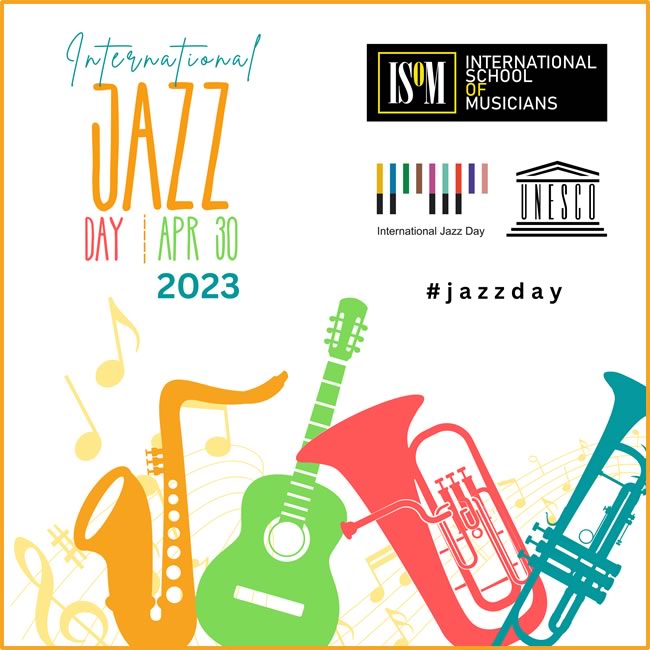
Photo: International Jazz Day 2023 Poster, London, UK.

Photo: International Jazz Day 2023 Poster, Goa, India.
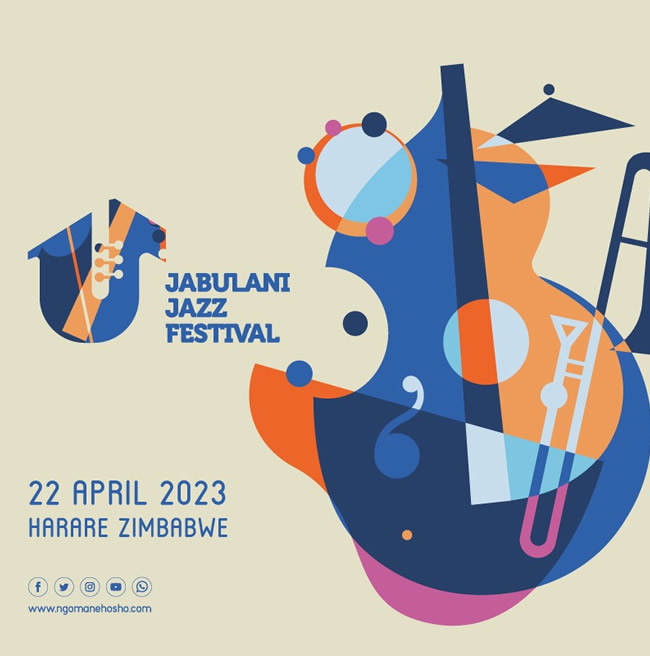
Photo: International Jazz Day 2023 Poster, Harare, Zimbabwe.

Photo: International Jazz Day 2023 Poster, Cuba, Guatemala.
WASHINGTON, May 1, 2023 — The 12th annual International Jazz Day came to a thrilling close with a spectacular All-Star Global Concert featuring performances from Beijing, Beirut, Johannesburg, New York, Rio de Janeiro, Vienna, and beyond. The All-Star Global Concert showcased celebrated jazz artists, including Cyrille Aimée (France), Ambrose Akinmusire (USA), Thana Alexa (Croatia), John Beasley (USA), Dee Dee Bridgewater (USA), Musekiwa Chingodza (Zimbabwe), Emmet Cohen (USA), Kurt Elling (USA), Oran Etkin (Israel), Tom Gansch (Austria), Christian McBride (USA), Sérgio Mendes (Brazil), Marcus Miller (USA), Thandi Ntuli (South Africa), Dianne Reeves (USA), Antonio Sánchez (Mexico), Somi (Rwanda) and many others.
To mark International Jazz Day 2023, former U.S. President Bill Clinton and UNESCO Goodwill Ambassador Herbie Hancock met for a historical conversation about the impact of jazz on their lives and humanity.
The All-Star Global Concert opened with acclaimed vocalist Somi and her remarkably unique rendition of “House of the Rising Sun” with John Beasley and Ben Williams. Next, the Blue Note China Jazz Orchestra gave a rousing take on the Gershwin standard, “Fascinating Rhythm.” Next, from Casablanca, Morocco, JazzWomenAfrica performed its composition “Bull Door,” sharing the musical traditions of Senegal, Equatorial Guinea, Mali, Togo, and Ghana. Next, vocalist Yumi Park and Brazilian pianist Marcos Ariel delivered a compelling “Mas Que Nada” presentation from Rio de Janeiro. Next, Oran Etkin and Mbira player Musekiwa Chingodza provided a heartwarming performance from the streets of rural Zimbabwe. Next, Herbie Hancock enlisted Ambrose Akinmusire and Walter Smith, III, to perform Wayne Shorter’s iconic composition, “Footprints.” Finally, Dianne Reeves brought the evening to a gorgeous close with her stunning rendition of Horace Silver’s “Peace.”
UNESCO Director-General Audrey Azoulay noted, “Today, let us pay tribute to the genius of the creators and musicians who have been defining and redefining jazz for over a century, from Ella Fitzgerald to Manu Dibango. But let us also commit to supporting jazz players across the globe - so that the universal message of peace and humanity conveyed by jazz music resonates worldwide.”
UNESCO Goodwill Ambassador Herbie Hancock said, “Respect for human dignity is firmly integrated into the DNA of jazz. International Jazz Day honors this important value by embracing the peace and freedom that jazz so eloquently proclaims. And that is the spirit of jazz - finding delight in diversity and creating harmony out of our differences.”
The International Jazz Day 2023 celebration included thousands of jazz performances, jam sessions, master classes, education and community outreach initiatives, and other special events in 195 countries and all 50 U.S. states. Additionally, UNESCO and the Herbie Hancock Institute of Jazz presented educational programs in five languages.
Each year on April 30, International Jazz Day brings together countries and communities on all continents to highlight the power of jazz as a force for freedom and creativity, promote intercultural dialogue through respect and understanding, and unite people worldwide. The UNESCO Member Nations adopted International Jazz Day on the initiative of UNESCO Goodwill Ambassador Herbie Hancock, who co-chairs the annual celebration with UNESCO Director-General Audrey Azoulay. UNESCO and the United Nations recognize this day in their official calendars.
Source: Herbie Hancock Institute of Jazz
|GlobalGiants.Com|







Edited & Posted by the Editor | 10:15 AM | View the original post
April 22, 2023
UNESCO invites Governments to submit Nominations for the 2023 Prize for Girls' and Women's Education
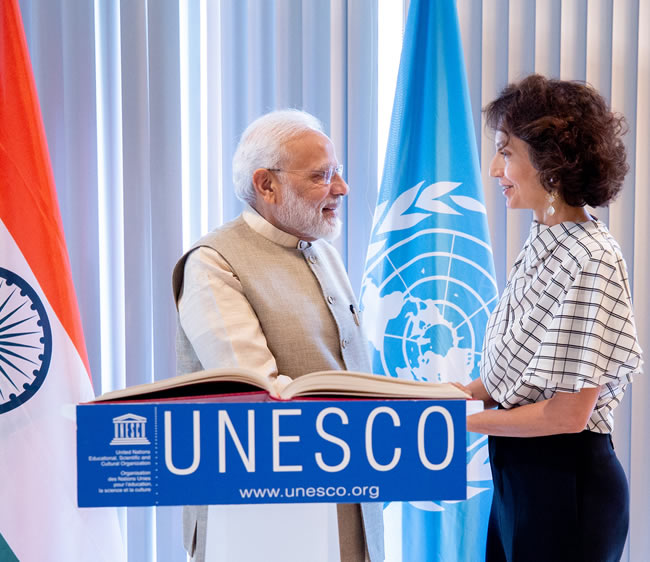
Photo: Narendra Modi, Prime Minister of the Republic of India, visits the UNESCO Headquarters in Paris, France. August 23, 2019. Image provided by @ copyright © UNESCO/Christelle ALIX. (File Photo)
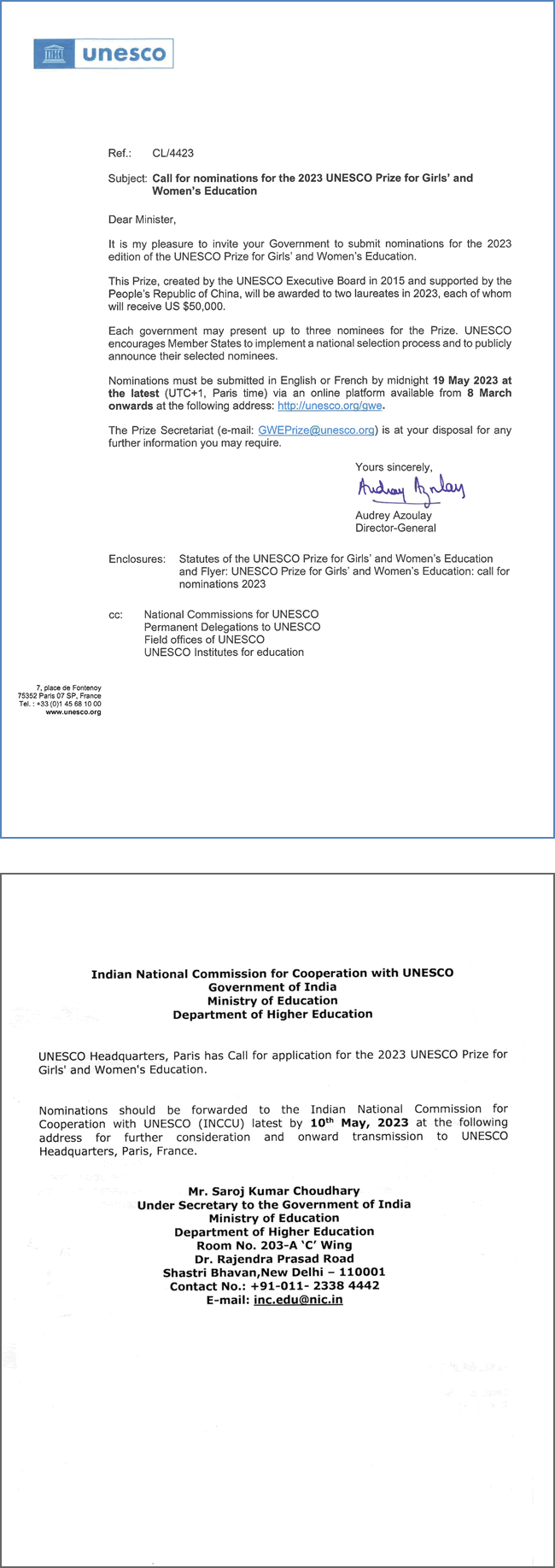
Paris, France, April 21, 2023 — On International Women’s Day, UNESCO launched the call for nominations for the 2023 UNESCO Prize for Girls and Women’s Education. The Prize awards US$ 50,000 annually to two laureates making outstanding efforts in favor of girls and women’s education.
UNESCO said it believes in the transformative power of education to unlock the potential of women and girls, advance gender equality, and achieve just, equal, and inclusive societies.
So, UNESCO has invited the Governments of UNESCO Member States to nominate up to three individuals, institutions, or organizations who have made solid and innovative contributions in favor of girls’ and women’s education.
Interested candidates may contact their country’s National Commission for UNESCO or Permanent Delegation to UNESCO for nomination submission.
Nominations must meet the eligibility and selection criteria set by the Prize. In addition, nominated projects must be established and running for at least two years and show potential to be replicable and scalable. An independent International Jury of five experts will assess nominations based on the project’s potential for impact, innovation, and sustainability.
The submission deadline is May 19, 2023 (midnight, Paris time).
National Commissions for UNESCO and Permanent Delegations to UNESCO can submit the Nominations online in English or French on behalf of the candidates.
Based on the recommendations of the Jury, the Director-General of UNESCO will announce the 2023 laureates who will receive the award on October 11, 2023, as part of the “International Day of the Girl” celebrations.
Sources:
• UNESCO Headquarters, Paris.
• Indian National Commission for Cooperation with UNESCO (INCCU), Department of Higher Education, Ministry of Education, Government of India.
|GlobalGiants.Com|
— The editor is a Higher Education Consultant holding UNESCO International Institute for Educational Planning, Paris, France Certification.







Edited & Posted by the Editor | 7:30 AM | View the original post
April 13, 2023
Global Sovereign Debt Roundtable Co-Chairs, IMF, World Bank, and India (as G20 Presidency) have issued a Press Statement.
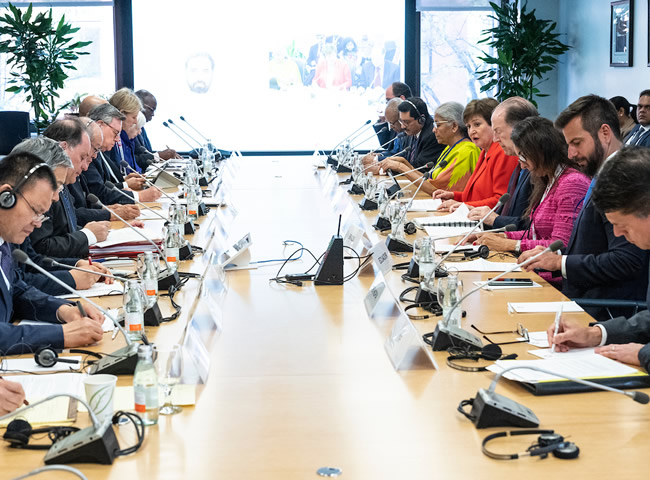
Photo: The Global Sovereign Debt Roundtable co-chaired by IMF, World Bank, and India (as G20 Presidency). April 12, 2023. Washington, DC. IMF Photo.
Washington, DC, April 12, 2023 — The Global Sovereign Debt Roundtable (GSDR) met today and discussed debt sustainability and restructuring challenges and how to address them. At the end of the meeting, the International Monetary Fund Managing Director Kristalina Georgieva, World Bank Group President David Malpass, and Indian Minister of Finance Nirmala Sitharaman, co-chairs of the GSDR, released the following statement.
“The Global Sovereign Debt Roundtable (GSDR) met today and discussed debt sustainability and restructuring challenges and ways to address them. We are grateful to all the participants, including Paris Club and non-Paris Club creditors, debtor countries, and private sector representatives. The discussion focused on the actions that can be taken now to accelerate debt restructuring processes and make them more efficient, including under the G20 Common Framework.
We agreed on the importance of urgently improving information sharing, including on macroeconomic projections and debt sustainability assessments, at an early stage of the process. Accordingly, the IMF and World Bank will rapidly issue staff guidance on information sharing at each step of the restructuring process.
The meeting discussed the role of Multilateral Development Banks (MDBs) in these processes by providing net positive flows of concessional finance. In addition, the conference welcomed the International Development Association’s (IDA) provision of positive net flows and the ex-ante implicit debt relief through increased concessions and grants to countries facing higher risks of debt distress.
To clarify critical concepts to support the predictability and fairness of debt restructuring processes, a workshop will be organized in the following weeks on assessing and enforcing the comparability of treatment. Moreover, further work will be undertaken on principles regarding cut-off dates, formal debt service suspension at the beginning of the process, treatment of arrears, and perimeter of debt to be restructured, including concerning domestic debt. This work will also help in clarifying potential timetables to accelerate debt restructurings.
The IMF, World Bank, and the G20 Presidency will continue to work closely with other partners to support the international response to current debt challenges.”
Participants in the meeting included the three co-chairs (International Monetary Fund, World Bank, and India as G20 Presidency), official bilateral creditors (China, France as chair of the Paris Club, Japan, Saudi Arabia, United Kingdom, United States), debtor countries (Ecuador, Ethiopia, Ghana, Sri Lanka, Suriname, Zambia), Brazil as the forthcoming 2024 G20 Presidency and private sector representatives (Institute of International Finance, International Capital Markets Association, BlackRock, Standard Chartered).
Source: IMF Communications Department
|GlobalGiants.Com|







Edited & Posted by the Editor | 1:46 PM | View the original post
April 11, 2023
IMF announces World Economic Outlook April 2023
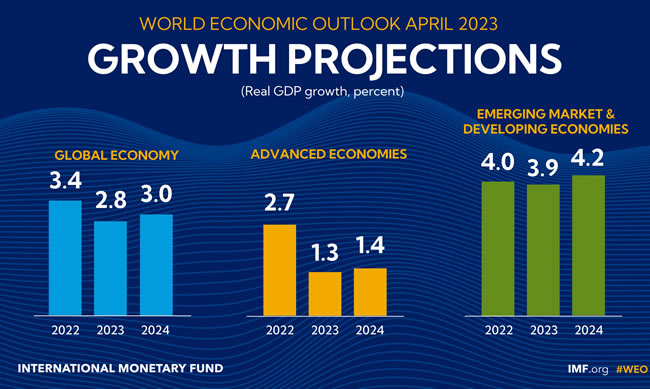
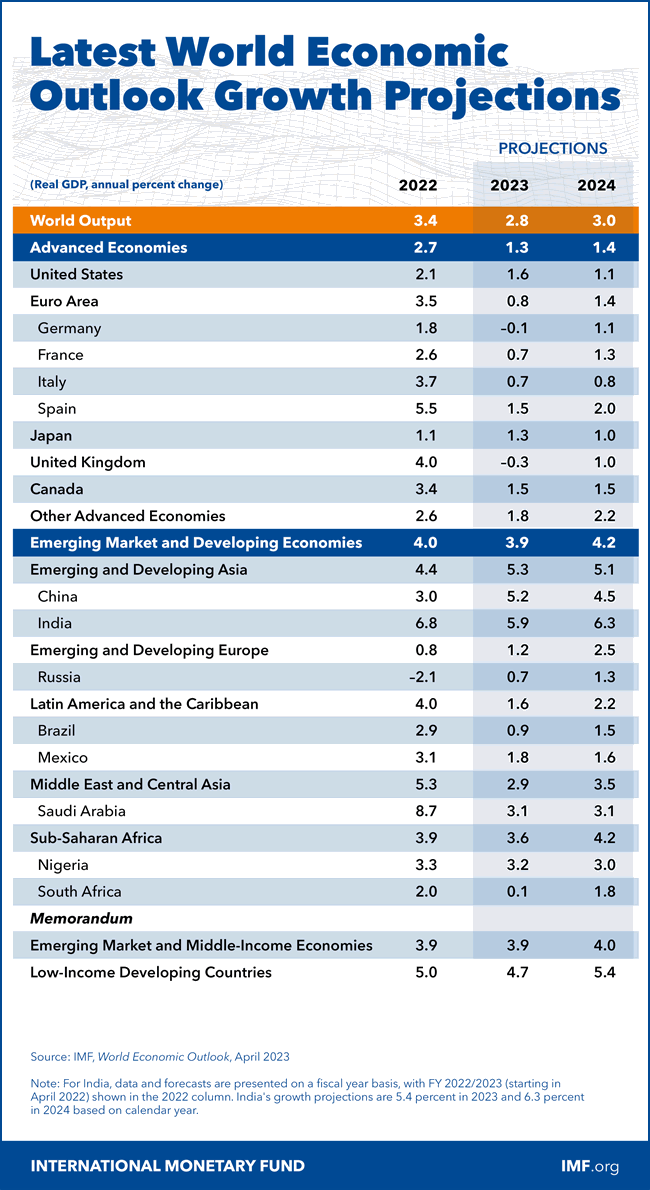
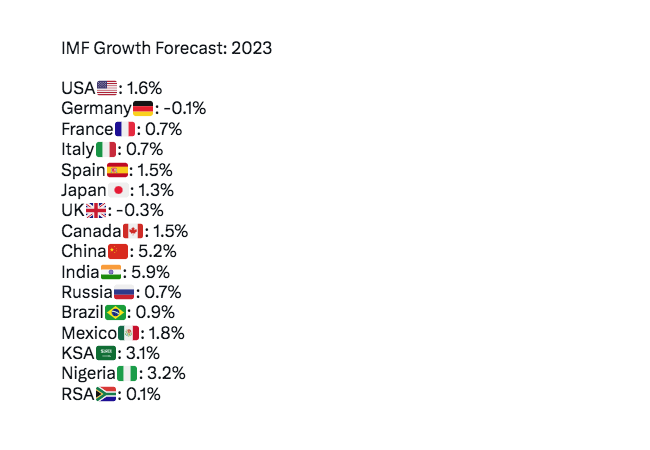
Washington DC, April 11, 2023 — In its World Economic Outlook’s press briefing, the IMF (International Monetary Fund) announced today that the baseline forecast for global output growth is 0.1 percentage points lower than that predicted in the January 2023 WEO Update. It would rise to 3.0 percent in 2024.
“The world economy is still recovering from the unprecedented upheavals of the last three years, and the recent banking turmoil has increased uncertainties. As a result, we expect global output growth to fall from 3.4% last year to 2.8% in 2023 before rising to 3% in 2024, mostly unchanged from our January projections. Advanced economies would see an especially pronounced growth slowdown from 2.7% in 2022 to 1.3% in 2023. Global headline inflation is set to fall from 8.7% in 2022 to 7% in 2023 due to lower commodity prices, but underlying core inflation is proving to be stickier. Importantly, this outlook assumes that recent financial stresses remain contained,” said Pierre-Olivier Gourinchas, the IMF’s Chief Economist.
Much uncertainty clouds the short- and medium-term outlook as the global economy adjusts to the shocks of 2020-22 and the recent financial sector turmoil. As a result, recession concerns have gained prominence, while worries about stubbornly high inflation persist.
“Once again, risks are heavily tilted to the downside. They have risen with the recent financial turmoil. Most prominently, recent banking system turbulence could result in a sharper and more persistent tightening of global financial conditions. The simultaneous rate hikes across countries could have more contractionary effects than expected, especially as debt levels are at historical highs. There might be a need for more monetary tightening if inflation remains stickier than expected. These risks and more could all materialize at a time when policymakers face much more limited policy space to offset negative shocks, especially in low-income countries,” added Gourinchas.
With the fog around current and prospective economic conditions thickening, policymakers have a narrow path toward restoring price stability while avoiding a recession and maintaining financial stability. However, achieving strong, sustainable, and inclusive growth will require policymakers to stay agile and be ready to adjust as information becomes available.
“First, as long as financial stress is not systemic as it is now, the fight against inflation should remain the priority for central banks. Second, central banks should use separate tools to safeguard financial stability and clearly communicate their objectives to avoid unwarranted volatility. Further, financial policies should remain laser-focused on preserving financial stability and watch for any buildup of risks in banks, non-banks, and the real estate sectors. Third, in many countries, fiscal policy should tighten to ease inflation pressures, restore debt sustainability, and rebuild fiscal buffers. Finally, in the event of capital outflows that raise financial stability risks, emerging market and developing economies should use the integrated Policy framework, combining temporary targeted foreign exchange interventions and capital flow measures where appropriate,” said Gourinchas.
The International Monetary Fund (IMF) lowered India’s economic growth projection for the current fiscal to 5.9 percent from 6.1 percent earlier. Yet India will continue to be the fastest-growing economy in the world.
Source: IMF
|GlobalGiants.Com|







Edited & Posted by the Editor | 1:52 PM | View the original post
April 10, 2023
International Monetary Fund (IMF) is hosting the 2023 Spring Meetings in Washington, DC, from April 10 to April 16
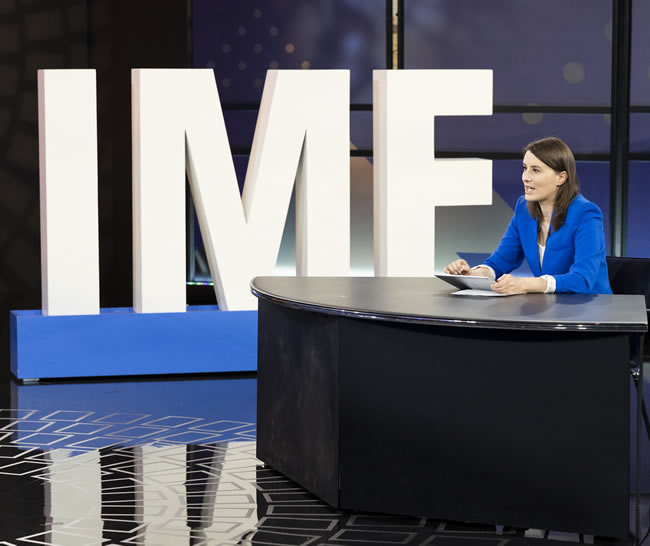
Photo: IMF economists participate in a Capacity Development Talk titled “Digital Money: Building Capacity for a Virtuous Circle” moderated by Eva-Maria Graf at the International Monetary Fund Headquarters, Washington, DC. April 11, 2022. IMF Photo/Cory Hancock. (File Photo)
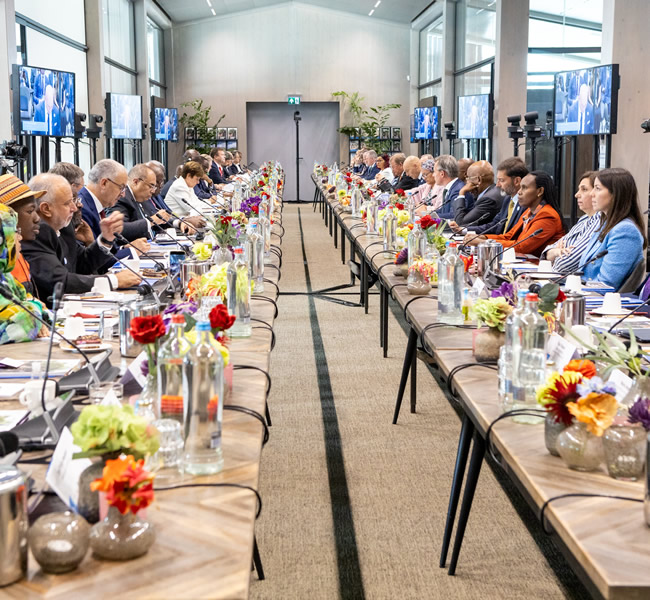
Photo: IMF Managing Director Kristalina Georgieva participates in a meeting at the Global Center on Adaptation, Rotterdam, Netherlands. September 5, 2022. IMF Photo/Eric Kampherbeek. (File Photo)
Washington, DC, April 08, 2023 — The IMF is preparing to host thousands of delegates and media at the 2023 Spring Meetings in Washington, DC.
In her Spring Meetings Curtain Raiser speech, the Managing Director of the IMF, Kristalina Georgieva, said that despite surprisingly resilient labor markets, strong consumer demand, and the uplift in China, the world economy might grow less than 3% this year. However, to brighten growth prospects, three themes that need to be addressed are fighting inflation and safeguarding financial stability, improving medium-term opportunities for growth, and fostering solidarity to reduce global disparities.
“Central banks should continue to use interest rates to fight inflation while using financial policies to ensure financial stability,” said Georgieva, speaking to a packed room of diplomats at Meridian International Center in Washington.
On fostering solidarity to reduce global disparities, Georgieva said that the IMF had provided nearly $300 billion in new financing for 96 countries since the start of the Covid pandemic.
The IMF and World Bank will jointly host the meetings of the world’s finance ministers, central bankers, civil society organizations, parliamentarians, and nearly 600 journalists.
The 2023 Spring Meetings of the World Bank Group (WBG) and the International Monetary Fund (IMF) will occur from Monday, April 10 to Sunday, April 16, in the WBG and IMF headquarters in Washington, DC.
Source: IMF
|GlobalGiants.Com|
— The editor holds IMF Washington DC’s distinguished Academic Certificate in Financial Market Analysis.







Edited & Posted by the Editor | 7:37 AM | View the original post
April 7, 2023
UNESCO IIEP announces MartÃn Benavides, former Minister of Education of Peru, as its new Director
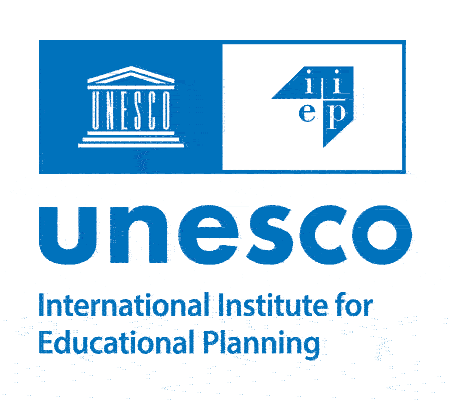
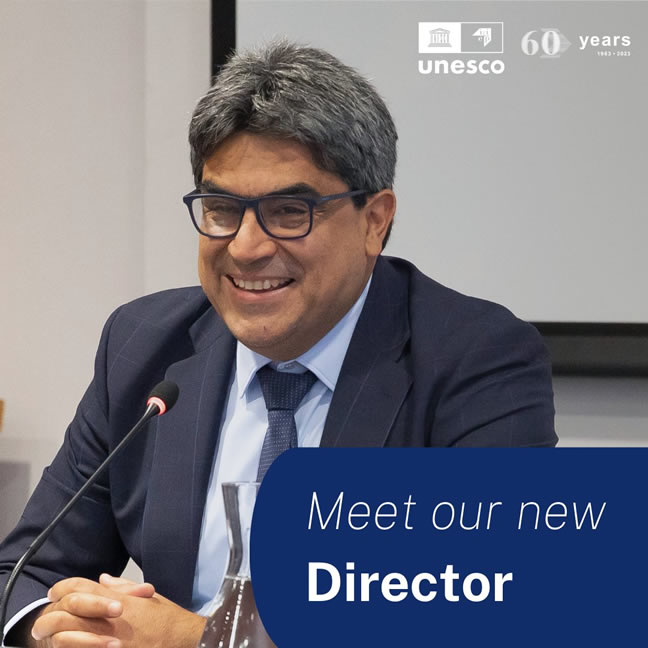
Photo: MartÃn Benavides, the new UNESCO IIEP Director.
Paris, France, April 07, 2023 — The UNESCO International Institute for Educational Planning (IIEP) has welcomed MartÃn Benavides as its new Director.
Benavides is a Peruvian sociologist who served as the Minister of Education from February 2020 to November 2020. In this role, he designed the country’s national strategy for distance education while overseeing all levels of the education system, from pre-primary to higher education.
As IIEP Director, Benavides will provide strategic leadership for the Institute, celebrating six decades of supporting UNESCO Member States in planning and managing their education systems in 2023.
In his new role, Benavides will oversee IIEP’s capacity development offer, which includes technical cooperation for countries, a dynamic, multi-lingual training offer, and knowledge production and mobilization through its three offices in Buenos Aires, Dakar, and Paris.
“I look forward to analyzing what constitutes planning today - we know it goes beyond policy design, implementation, or evaluation. So, we will reflect on this and present new ideas for educational planning to our partners and governments. This is crucial for addressing the challenges of the post-COVID-19 era,” said Benavides.
“On behalf of the IIEP Board, I am thrilled to welcome Dr. MartÃn Benavides during this transformational time for education,” said IIEP Governing Board Chair José Weinstein. “As a former Peruvian Minister of Education and sociologist, he brings not only a wealth of knowledge to the role, but the leadership and vision to further IIEP in its important mission of developing the capacities of education actors worldwide,” Weinstein said.
Before joining IIEP in March 2023, Benavides served as Director of the Observatory of Higher Education, and from 2018, he was a senior professor at the Pontifical Catholic University of Peru (Lima). Earlier in his career, in 2002, Benavides joined the Peruvian think tank Group for the Analysis of Development (GRADE), where he was first a senior researcher and then Executive Director from 2008 to 2018.
From 2015 to 2018, Benavides was a member of the Board of Directors of Peru’s National Superintendence of Higher University Education (SUNEDU). From 2018 to 2020, he served as superintendent of this body and led the implementation of the country’s university reform.
Benavides, who holds a Master’s Degree in Educational Policy and a Ph.D. from Pennsylvania State University, has published extensively on the sociology of education, educational policy, as well as issues related to social stratification, social classes, inequality, and youth. He has also been a visiting researcher and fellow at the Population and Development Center (Ceped) at the Université de Paris and the Center for Advanced Study in the Behavioral Sciences (CASBS) at Stanford University.
The UNESCO International Institute for Educational Planning is an arm of UNESCO created in 1963 in Paris, France. It develops the capacities of education actors to plan and manage their education systems through training, technical assistance, policy research, and knowledge-sharing programs.
It issues country-specific information for use by local educational administrations. For example, the report “Funding Mechanism of Thrust Areas of Higher Education in India” is jointly published by UNESCO IIEP and UGC (University Grants Commission), India.
Source: UNESCO IIEP
|GlobalGiants.Com|
— The Editor is a UNESCO IIEP trained & certified “Independent Appraiser” of Government Education Plans.







Edited & Posted by the Editor | 10:48 AM | View the original post
April 2, 2023
Artificial Intelligence: UNESCO calls on all Governments to implement Global Ethical Framework without delay
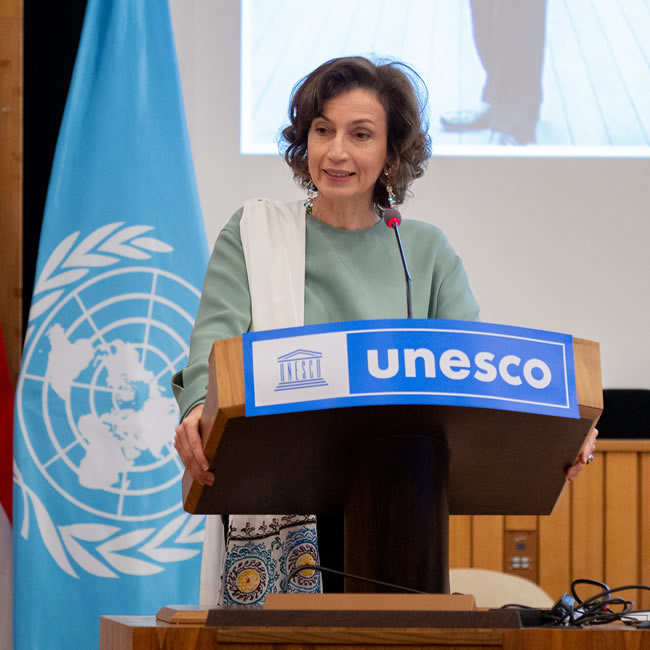
Photo: UNESCO Headquarters Paris. A lecture on “Science at the service of humanity.” December 7, 2022. Image provided by & Copyright © UNESCO/Christelle ALIX. (File Photo)
Paris, France, March 31, 2023 — Following the calls by over 1000 tech workers this week for a pause in training in the most powerful AI systems, including Chat GPT, UNESCO has called on countries to fully implement its Recommendation on the Ethics of Artificial Intelligence immediately. This global normative framework, adopted unanimously by the 193 Member States of the Organization, provides all the necessary safeguards.
“The world needs stricter ethical rules for artificial intelligence: this is the challenge of our time. UNESCO’s Recommendation on the ethics of AI sets the appropriate normative framework. Our Member States all endorsed this Recommendation in November 2021. So it is high time to implement the strategies and regulations at the national level. We have to walk the talk and ensure we deliver on the Recommendation’s objectives,” UNESCO’s Director-General Audrey Azoulay said in a statement.
UNESCO’s Recommendation on the Ethics of Artificial Intelligence is the first global framework for the ethical use of artificial intelligence. It guides countries in maximizing the benefits of AI and reducing the risks it entails. To this end, it contains values and principles and detailed policy recommendations in all relevant areas.
UNESCO is concerned by many of the ethical issues raised by these innovations, in particular discrimination and stereotyping, including the issue of gender inequality, but also the fight against disinformation, the right to privacy, the protection of personal data, and human and environmental rights.
Industry self-regulation is insufficient to avoid these ethical harms. The Recommendation provides the tools to ensure that AI developments abide by the rule of law, avoiding damage and ensuring that when harm is done, accountability and redressal mechanisms are at hand for those affected.
UNESCO’s Recommendation places a Readiness Assessment tool at the core of its guidance to Member States. This tool enables countries to ascertain the competencies and skills required in the workforce to ensure robust regulation of the artificial intelligence sector. It also provides that the States regularly report on their progress and practices in artificial intelligence by submitting a periodic report every four years.
More than 40 countries in all regions of the world are already working with UNESCO to develop AI checks and balances at the national level, building on the Recommendation.
UNESCO has called on all countries to join the movement it is leading to build an ethical AI. UNESCO will present the Progress Report at the UNESCO Global Forum on the Ethics of Artificial Intelligence in Slovenia in December 2023.
Source: UNESCO
|GlobalGiants.Com|







Edited & Posted by the Editor | 1:56 AM | View the original post
February 21, 2023
1st G20 Finance Ministers & Central Bank Governors and 2nd G20 Finance & Central Bank Deputies Meetings from 22nd-25th February 2023 begins tomorrow in Bengaluru, India
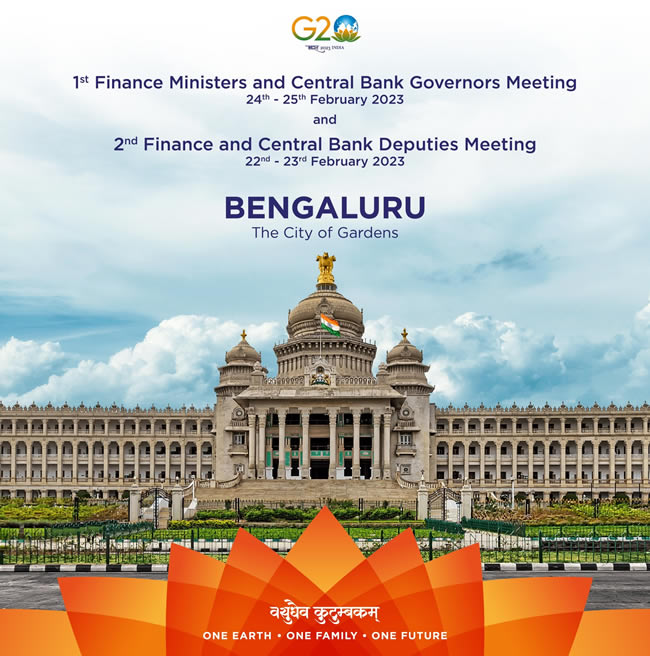
New Delhi, February 21, 2023 — The First G20 Finance Ministers and Central Bank Governors (FMCBG) meeting under the G20 Indian Presidency scheduled for 24th-25th February 2023 begins tomorrow in Bengaluru, Karnataka.
While addressing a press briefing today, Mr. Ajay Seth, Secretary, Department of Economic Affairs, Ministry of Finance, and Dr. Anantha V. Nageswaran, Chief Economic Advisor, Ministry of Finance, said that Union Finance Minister Smt. Nirmala Sitharaman and the Governor Reserve Bank of India (RBI), Dr. Shaktikanta Das, will jointly chair this meeting.
Mr. Seth informed the media that the G20 FMCBG meeting would be preceded by a G20 Finance and Central Bank Deputies (FCBD) panel on February 22, 2023. Mr. Seth and Dr. Michael D. Patra, Deputy Governor, RBI, will co-chair the FCBD meeting.
Union Minister for Information & Broadcasting and Youth Affairs & Sports, Government of India, Shri Anurag Thakur, will inaugurate the G20 FCBD meeting tomorrow.
The 1st G20 FMCBG meeting under the G20 Indian Presidency on 24th-25th February will see the participation of Finance Ministers and Central Bank Governors of the G20 members, invitee members, and heads of International Organisations. In total, there will be 72 delegations attending the meeting.
The Indian Presidency has designed the meeting agenda to foster a meaningful exchange of ideas among Ministers and Governors on pragmatic and influential approaches to address some key global economic issues.
The meeting will spread over three sessions on February 24th-25th, covering issues such as strengthening multilateral development banks to address shared global challenges of the 21st century, financing for resilient, inclusive, and sustainable “cities of tomorrow,” leveraging Digital Public Infrastructure (DPI) for advancing financial inclusion, and productivity gains. The sessions will also cover issues related to the global economy, global health, and international taxation.
The discussions in the G20 FMCBG meeting would provide a clear mandate for the various workstreams of the G20 Finance Track in 2023.
G20 India will also organize a “Ratri Bhoj Par Samvad” and cultural programs for the Finance Ministers, Central Bank Governors, and their delegations to showcase India’s diverse cuisines and culture.
Mr. Ajay Seth said that cultural programs showcasing India’s rich cultural odyssey across Karnataka would welcome ministers, governors, deputies, and delegates. The performance would reflect the artistry and splendor of Karnataka’s cultural ethos and legacy.
The Secretary said that on February 26, the delegates would make excursions and enjoy the beautiful natural landscape of Karnataka.
Source: Ministry of Finance, Government of India
|GlobalGiants.Com|







Edited & Posted by the Editor | 11:52 AM | View the original post
February 4, 2023
UNESCO leads the Global Dialogue on regulating Digital Platforms and combating Disinformation and Hate Speech
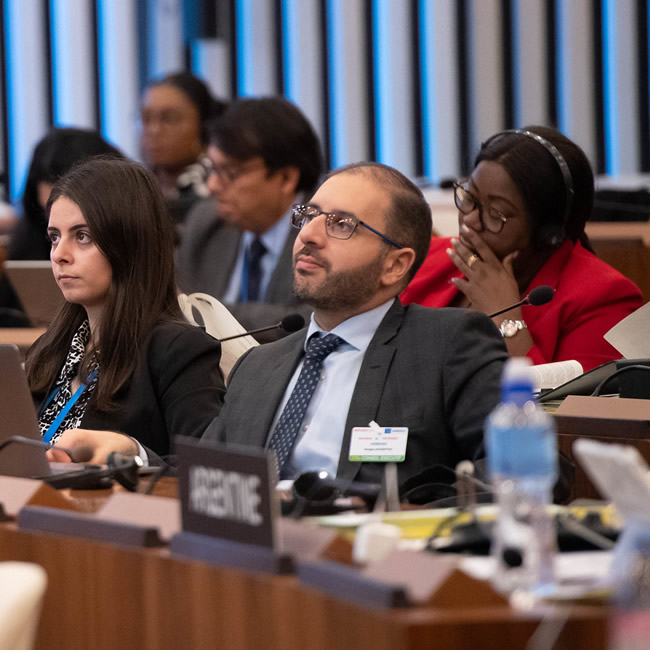
Photo: UNESCO Headquarters, Paris. A Session of the Unesco Executive Council. October 12, 2022. Image provided by & Copyright © UNESCO/Cyril Bailleul. [File Photo]
Paris, February 3, 2023 — As part of its Mandate, UNESCO has launched a global dialogue to provide guidelines for regulating digital platforms, fighting disinformation and hate speech, and protecting freedom of expression and human rights. The high point will be an international conference organized at the Organization’s Paris headquarters on 21-23 February. It will result in the presentation by UNESCO in mid-2023 of Global Guidelines for Governments, Regulatory Bodies, and Digital Companies.
“The call is now coming loud and clear from all quarters. It is time to address one of the defining questions of our age, with implications for democracy and human rights worldwide: the challenge of how to support States in developing principles and rules for digital platforms so that they enable freedom of expression and promote the availability of accurate and reliable information,” UNESCO Director-General Audrey Azoulay remarked.
• A flawed Business Model needs Correction.
Social media and other digital platforms have empowered people worldwide to communicate, share information, and transform their societies. But increasingly, these platforms are breeding grounds for disinformation, hate speech, and conspiracy theories. In recent years, the issue of monitoring and moderating content has been essential in violence, insurrection, marred elections, and democratic transfers of power in scores of countries, UNESCO said.
Studies show that people often prioritize engagement at any cost. It leads to algorithms favoring the most controversial content because it triggers the most reaction, despite the evidence that this content can damage the fabric of the societies, sowing distrust, helping to seed extremism, and undermining fundamental human rights. Moreover, there appear to be vast imbalances between regions and languages, with moderation resources sometimes distributed based on financial or political interests or far too late in response to public outrage once violence or election meddling has already occurred, UNESCO explained.
• Global Issues require Global Guidelines.
Many countries are advancing regulations to respond to these issues, but this needs to be coordinated and more cohesive, with some countries outside the international norms on freedom of expression. Given the global dominance of a limited number of players, the need for a consistent global approach has never been more pressing than right now.
As the United Nations agency for communication and information issues, UNESCO is leading global consultations on this topic, involving governments, regulatory bodies, digital companies, academia, civil society, and UN agencies. This international Dialogue will culminate in the first global conference specifically focused on guidance for regulating digital platforms from February 21 to 23, 2023. Thousands of representatives from these groups are already registered to participate.
UNESCO experts will then incorporate the feedback received during these discussions and engage in new consultations to finalize and publish the first global guidelines on the topic in mid-2023. With UNESCO’s expertise and support, governments, regulators, digital companies, and other groups would use these guidelines to implement policies and tools as needed.
UNESCO’s initiative responds to the call from the UN Secretary-General in “Our Common Agenda” to address the spread of disinformation and the denial of scientific facts, which poses “an existential risk to humanity.”
• UNESCO’s Mandate to provide Guidelines for Regulation.
UNESCO has a global mandate, enshrined in its constitution, to promote the free flow of ideas by word and image. It leads UN action to promote freedom of expression and access to information. It includes a decades-long history of providing guidance to and promoting cooperation between broadcast regulators and press councils, advancing international standards.
The Windhoek+30 Declaration on Information as a Public Good in the Digital Age, endorsed by UNESCO’s 193 Member States in 2021, calls for increased transparency of technology companies, support for the long-term viability of news media, and teaching media and information literacy to citizens everywhere.
Under the leadership of its Director-General, Audrey Azoulay, UNESCO is explicitly working to improve the transparency of digital platforms, including by developing a series of principles for transparency and accountability in the digital age. UNESCO also established the first global standard on the ethics of artificial intelligence, adopted unanimously by its Member States in 2021, which includes a specific call for “appropriate frameworks, including regulation.”
Source: UNESCO
|GlobalGiants.Com|







Edited & Posted by the Editor | 5:58 AM | View the original post
January 31, 2023
IMF (International Monetary Fund) reports World Economic Outlook January 2023
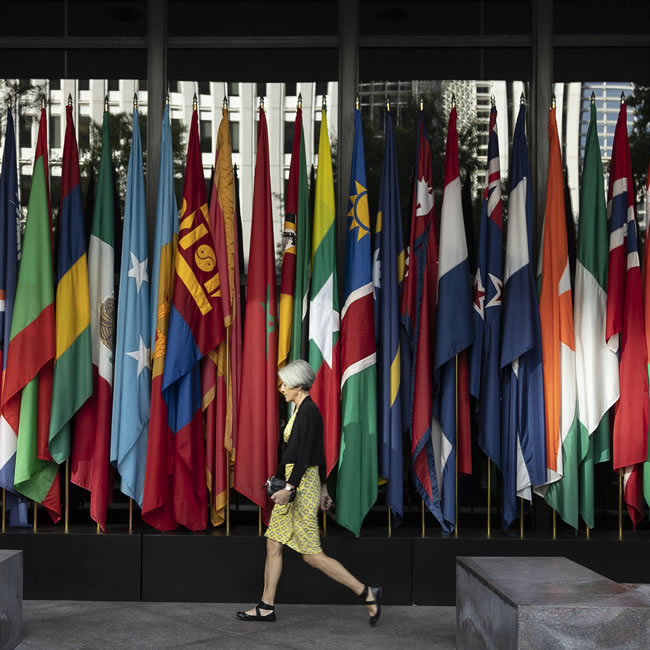
Photo: People walk past the flags outside the IMF building during the 2022 Annual Meetings at the International Monetary Fund. October 12, 2022. Washington, DC, United States. Image provided by & Copyright © IMF. IMF Photo/Ariana Lindquist. [File Photo]
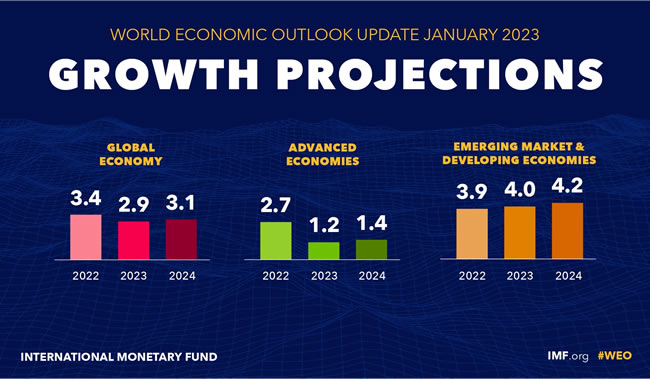
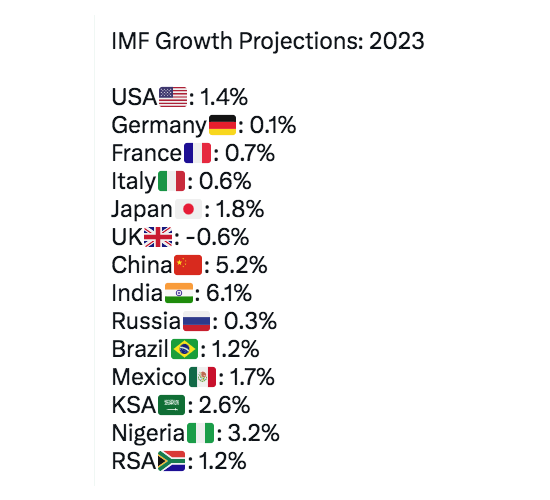
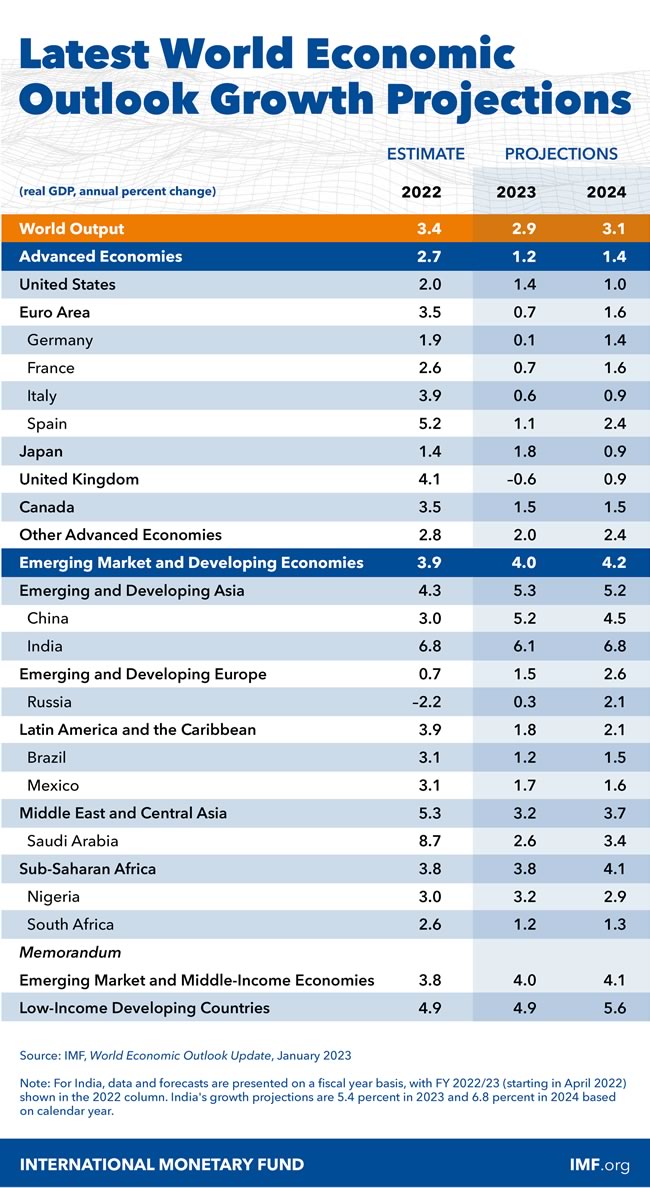
Washington, DC, January 31, 2023 — The global economy is poised to slow this year before rebounding next year. The IMF announced on Monday, January 30, 2023, that it expects global growth to slow from 3.4% in 2022 to 2.9% in 2023. The press briefing was held in Singapore to mark the launch of the January update of the World Economic Outlook report.
“The global economy will slow down this year before rebounding in 2024. But a global recession is not in our baseline. The important factors shaping the outlook are: On the downside, Russia’s war in Ukraine, and the global fight against inflation. On the upside, the reopening of China’s economy. Overall, we have a mild upward revision to our projections. The global economy has shown a lot of resilience. Labor markets are tight, household spending and business investment remain strong, and European economies have proved quite resilient against the energy crisis. Global growth is expected to slow from 3.4% in 2022 to 2.9% in 2023. The slowdown will be more pronounced for advanced economies. China and India will account for 50% of global growth. Global headline inflation is expected to fall from 8.8% in 2022 to 4.3% in 2024. Core inflation, however, is more persistent and remains too elevated. To sum up, barring new shocks, 2023 could be the year of turning points, with growth bottoming out and inflation decreasing,” said Pierre-Olivier Gourinchas, IMF’s Chief Economist.
However, the risks to the outlook remain tilted to the downside, even if adverse risks have moderated since October, and some positive factors seem more relevant.
“The balance of risks to the outlook remains tilted to the downside but is less skewed toward adverse outcomes than in the October WEO. Some upside risks have become more relevant. On the downside, China’s recovery could stall with spillovers to the rest of the world. Inflation could persist at high levels, requiring even tighter monetary policy. An escalation of the war in Ukraine remains a major risk to the global economy. A sudden market repricing could deteriorate financial conditions, especially for emerging and developing economies. On the upside, strong household balance sheets amid tight labor markets and robust wage growth could help sustain private demand. Easing remaining supply bottlenecks and easing labor market pressures could also allow for a soft landing with less monetary tightening,” added Gourinchas.
Gourinchas stressed that the global economic outlook hasn’t worsened, but the road back to a full recovery, with sustainable growth, stable prices, and progress for all, is only starting.
IMF’s Chief Economist concluded that the fight against inflation has started to bear fruit, but the battle is far from won:
Central banks need to raise actual policy rates above the neutral level and keep them there until inflation is on a sustained declining path.
Central banks and prudential authorities must closely monitor the buildup of risks and vulnerabilities, especially in the housing and non-bank financial sectors. Countries should also roll back the broad and untargeted support they provided households and firms to counter the cost-of-living crisis and instead adopt targeted measures to conserve fiscal space, allow the energy price signal to reduce energy demand, and avoid overly stimulating the economy.
More progress is needed on orderly debt restructuring through the Group of 20’s Common Framework. Non-Paris Club and private creditors have a crucial role to play.
Supply-side policies should reduce growth bottlenecks, improve resilience, alleviate price pressures, and accelerate the green transition.
Urgent action is needed to halt the forces of geoeconomics fragmentation and strengthen multilateral cooperation in areas of common interest; international trade, the global financial safety net, public health preparedness, and the climate transition.
Source: IMF
|GlobalGiants.Com|
— The editor is an IMF (IMF Institute for Capacity Development, Washington, DC) certified Financial Market Analyst.
Global growth is projected to fall from an estimated 3.4% in 2022 to 2.9% in 2023 before rising to 3.1% in 2024. Watch IMF Chief Economist @pogourinchas summarize the key findings of our latest World Economic Outlook Update: https://t.co/4ifKc9qi4j #WEO pic.twitter.com/HOCfdAl2mz
— IMF (@IMFNews) January 31, 2023
Global growth is slowing in 2023 but should rebound in 2024. China reopening, a strong US labor market with cooling inflation, and a mild winter in Europe have all helped avoid the worst. Read our latest #WEO: https://t.co/4ifKc9qi4j pic.twitter.com/f41UeRtHFW
— IMF (@IMFNews) January 31, 2023
What is Gross Domestic Product (GDP) and why should you care? Check out this Back to Basics video. https://t.co/TL2AKWizok pic.twitter.com/89qG2AYcni
— IMF (@IMFNews) January 26, 2023







Edited & Posted by the Editor | 6:22 AM | View the original post
January 20, 2023
India Meets with World Economic Forum to advance Progress in addressing Socioeconomic Challenges and G20 Agenda
World Economic Forum values its nearly 40-year collaborative history with India and looks forward to continued cooperation.
As part of its G20 presidency, India aims to promote just and equitable growth while also making significant progress on the most pressing domestic challenges.
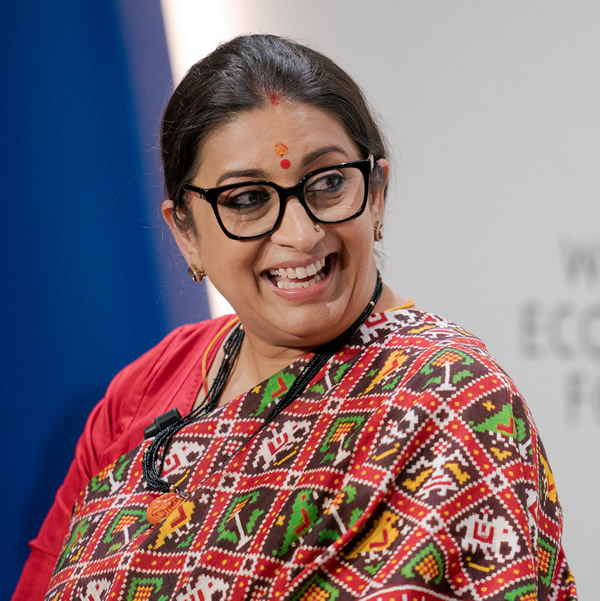
Photo: Smriti Zubin Irani, Minister of Women and Child Development of India, speaking in the “Economics of Women’s Health” session at the World Economic Forum Annual Meeting 2023 in Davos-Klosters, Switzerland, January 17, 2023. Image provided by & Copyright © World Economic Forum/Manuel Lopez.
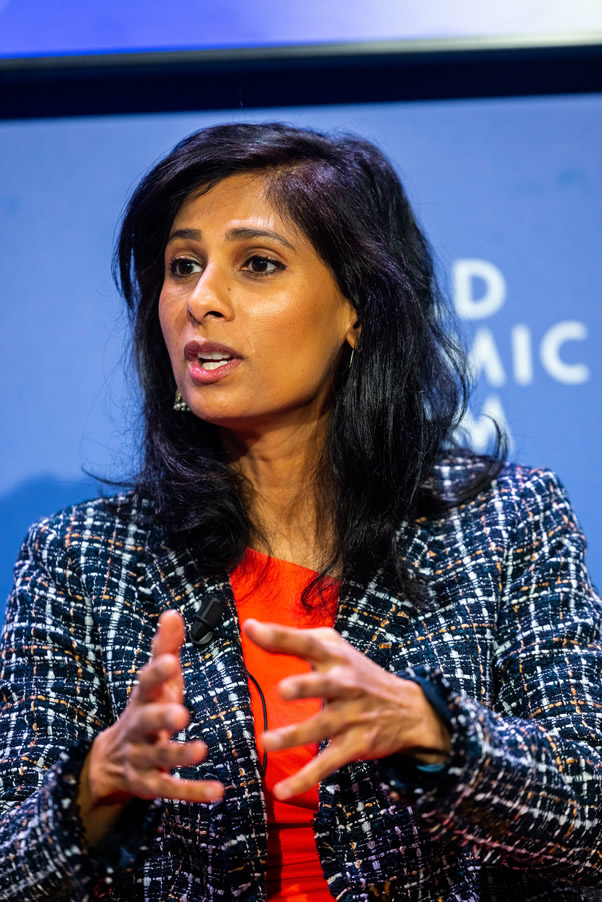
Photo: Gita Gopinath, International Monetary Fund (IMF), speaking during the “Fiscal Expansion: A Welcome Return or Ticking Bomb?” session at the World Economic Forum Annual Meeting 2023 in Davos-Klosters, Switzerland, January 18, 2023. Image provided by & Copyright © World Economic Forum/Ciaran McCrickard.
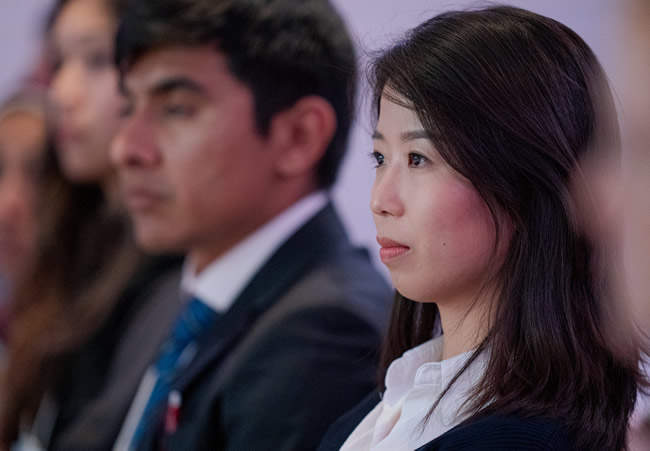
Photo: Participants at the “30x30 Ambition: Next Steps after Montreal” session at the World Economic Forum Annual Meeting 2023 in Davos-Klosters, Switzerland, January 19, 2023. Image provided by & Copyright © World Economic Forum/Manuel Lopez.
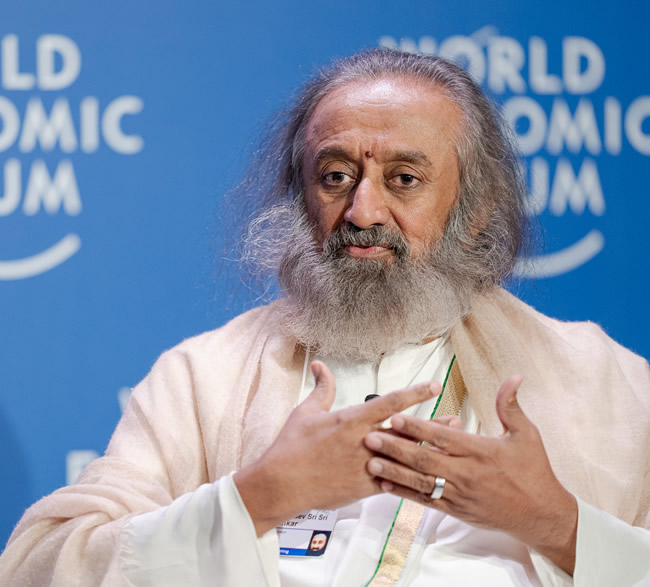
Photo: Gurudev Sri Sri Ravishankar, Founder, Art of Living Foundation, India, speaking in the “Renaissance of South Asia?” session at the World Economic Forum Annual Meeting 2023 in Davos-Klosters, Switzerland, January 19, 2023. Image provided by & Copyright © World Economic Forum/Manuel Lopez.
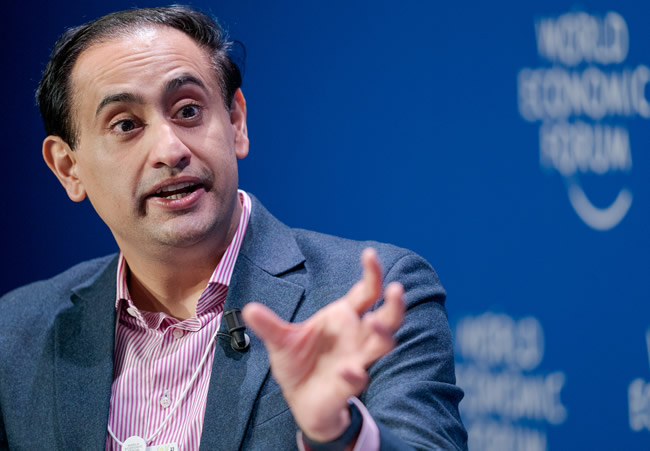
Photo: Rahul Kanwal, News Director, India Today and Aajtak, India Today Group, India, speaking in the “Renaissance of South Asia?” session at the World Economic Forum Annual Meeting 2023 in Davos-Klosters, Switzerland, January 19, 2023. Image provided by & Copyright © World Economic Forum/Manuel Lopez.
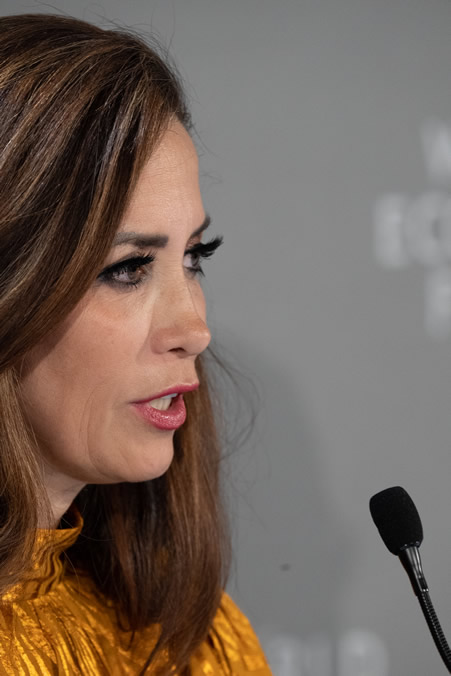
Photo: Claudia Romo Edelman, Founder, and CEO, Hispanic Star, USA, speaking in the “Press Conference: The Hispanic Promise 2.0” session at the World Economic Forum Annual Meeting 2023 in Davos-Klosters, Switzerland, January 17, 2023. Media Village, Press Conference Room. Image provided by & Copyright © World Economic Forum/ Greg Beadle.
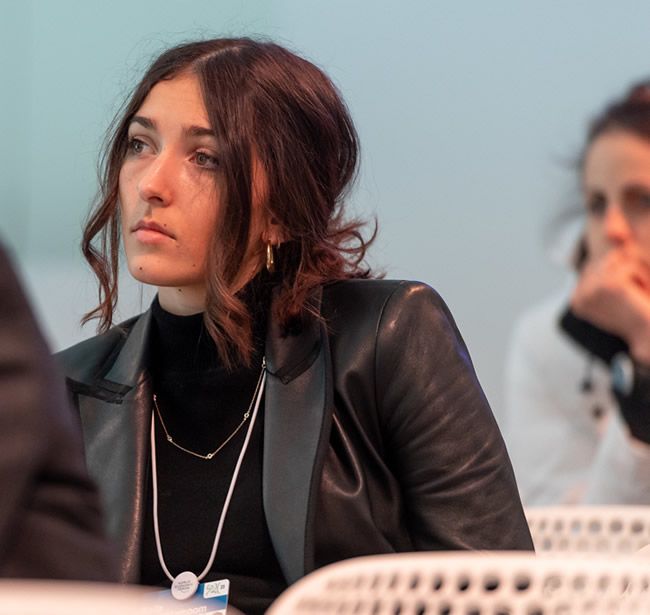
Photo: Participants at the “Reversing the Tide of Global Inequality” session at the World Economic Forum Annual Meeting 2023 in Davos-Klosters, Switzerland, January 19, 2023. Congress Centre - Spotlight. Image provided by & Copyright © World Economic Forum/Sandra Blaser.
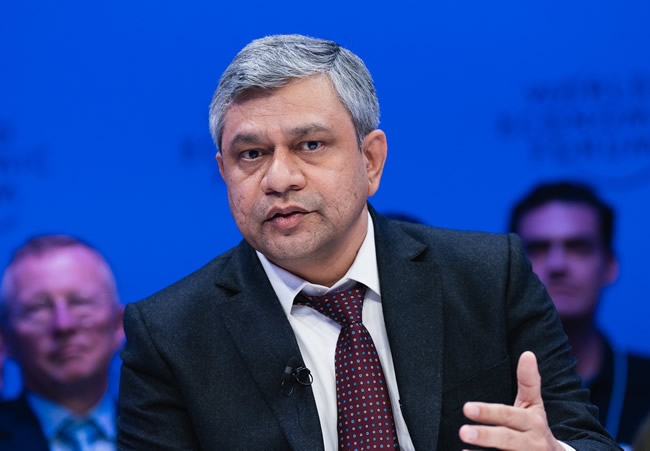
Photo: Ashwini Vaishnaw, Minister of Railways; Minister of Communications; and Minister of Electronics and Information Technology of India, speaking in the “Learning from Semiconductor Supply Shocks” session at the World Economic Forum Annual Meeting 2023 in Davos-Klosters, Switzerland, January 19, 2023. Image provided by & Copyright © World Economic Forum/Sikarin Fon Thanachaiary.
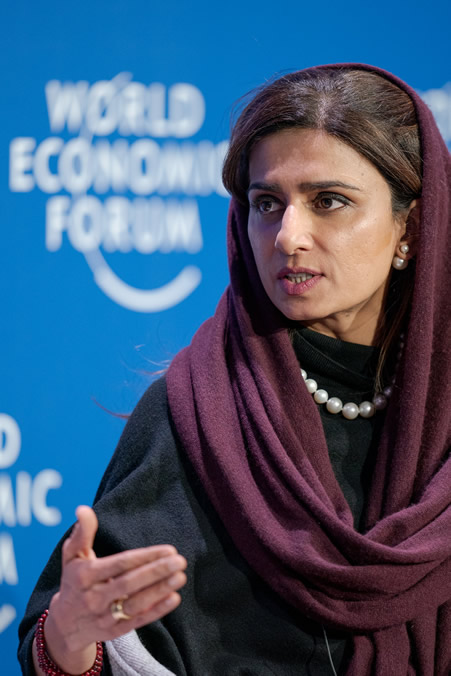
Photo: Hina Rabbani Khar, Minister of State for Foreign Affairs, Ministry of Foreign Affairs of Pakistan, speaking in the “Renaissance of South Asia?” session at the World Economic Forum Annual Meeting 2023 in Davos-Klosters, Switzerland, January 19, 2023. Image provided by & Copyright © World Economic Forum/Manuel Lopez.
Davos, Switzerland, January 20, 2023 - In Davos, world leaders continue to progress on solutions for the most pressing crises affecting the world. The World Economic Forum Annual Meeting 2023 comes as multiple concerns deepen divisions and fragment the geopolitical landscape. As a result, governments and businesses must address people’s immediate, critical needs while laying the groundwork for a more sustainable, resilient world by the decade’s end.
The program simultaneously addresses immediate crises and future long-term challenges and helps set the scene for India’s G20 presidency.
“I had the pleasure of meeting the Indian ministerial delegation and many of its top business leaders,” said Klaus Schwab, Founder and Executive Chairman of the World Economic Forum. “I commend the country’s decisive action on the climate case for renewables, its contribution to the global healthcare ecosystem, the focus on an economic model for women-led development, and its leadership on digital public infrastructure. India remains a bright spot amid global geoeconomics and geopolitical crises.”
The World Economic Forum shares a 38-year history with India and looks forward to continued partnership with the country during its G20 presidency under the leadership of Prime Minister Narendra Modi.
India is promoting just and equitable growth for all in the world during its G20 presidency.
“India’s G20 presidency comes at a crucial time. Prime Minister Modi’s leadership is critical in this fractured world,” Schwab said.
World leaders had gathered at the World Economic Forum Annual Meeting 2023 in the first major international gathering to address ongoing economic, energy, and food crises while laying the groundwork for a more sustainable, resilient world.
While many economists forecast recessionary risks in 2023 and see geopolitical tensions continuing to shape the global economy, there are glimmers of hope that pressures on food, energy, and inflation may be peaking.
“A perfect storm plagues our world on several fronts,” said United Nations Secretary-General António Guterres. He called for urgent action on many interconnected challenges, including the global economic crisis, climate, income and gender inequality, US-China relations, Russia’s invasion of Ukraine, and the lingering effects of the COVID-19 pandemic. “Now more than ever, it is time to forge the pathways to cooperation in our fragmented world,” he concluded.
Cooperation is becoming more virtual, and the Forum’s Global Collaboration Village showed how we could harness the metaverse for inclusive and effective international action. With the golden age of artificial intelligence underway, technology will provide more ways to bring people together.
“We can turn challenges into opportunities through collaboration, innovation, human goodwill, and ingenuity. It is the spirit of solving problems through mutual respect and cooperation. This is the spirit of Davos,” said Klaus Schwab, Founder and Executive Chairman World Economic Forum.
As crises converge, so too must the solutions. As a result, the Annual Meeting emphasized connections across significant systemic challenges. With over 480 sessions, more than 2,700 leaders - including over 350 public figures, government leaders, and 47 heads of state - came together at the Annual Meeting 2023 to address the world’s most pressing challenges.
Source: World Economic Forum
|GlobalGiants.Com|







Edited & Posted by the Editor | 1:30 PM | View the original post
January 12, 2023
UNESCO International Institute for Educational Planning (IIEP-UNESCO) Governing Board meets for the Future of Educational Planning

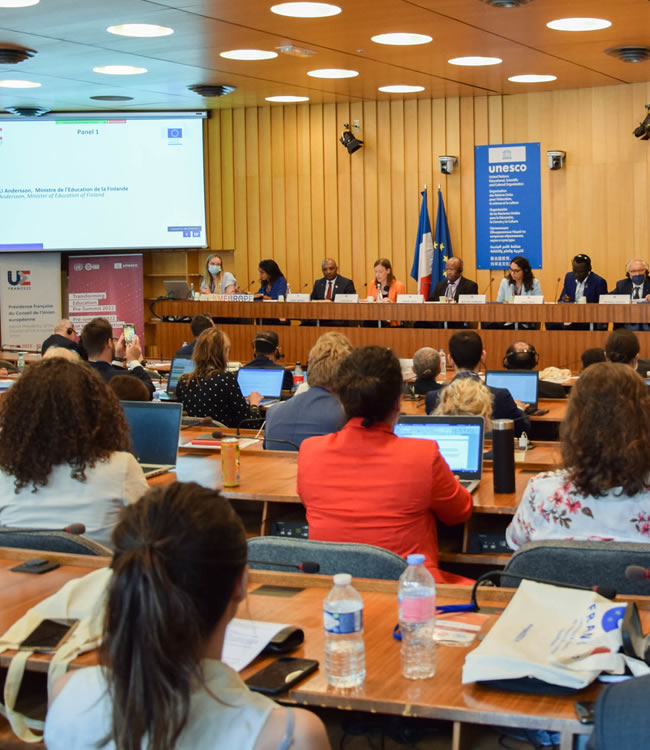
Photo: UNESCO Headquarters, Paris. Conference on Transforming Education through Regional Collaboration. Photographer: Lily CHAVANCE. Image provided by & copyright © UNESCO/Lily CHAVANCE.
Paris, January 12, 2023 — The Governing Board of the UNESCO International Institute for Educational Planning (IIEP-UNESCO) met in Paris, France, from 13 to December 14, 2022, to take stock of recent achievements and to chart a path forward for the Institute as the 60th anniversary of IIEP draws near.
Members of the Board (currently chaired by José Weinstein and representing all regions of the world) stressed that equitable access to education and equal opportunities for learning and skills development could only be achieved through solid planning and management of education systems. And this lies at the heart of IIEP’s mandate, established in 1963.
Six decades on, this remains more relevant than ever as countries worldwide strive to recover learning losses arising from the pandemic and transform education and foundational learning in a rapidly changing world.
To accompany UNESCO Member States on this journey, the Board welcomed IIEP’s recent reflections and adjustments to its core offer to countries. It includes a new global training strategy, which aims to sustainably meet the capacity needs of educational planners and systems across the globe.
Additionally, IIEP will launch a new Global Learning Academy in 2023 with a refreshed course catalog, a hybrid blended approach offering greater flexibility for professionals, and enhanced harmonization across the Buenos Aires, Dakar, and Paris offices. It will come amid a year-long celebration of IIEP’s 60th anniversary, which will also involve deep reflections on the future of planning and its place in a world facing evolving global threats and challenges.
Adding to the momentum, the Board welcomed IIEP’s new Resource Mobilization Plan as the Institute seeks to maintain and grow its funding base. In addition, a donor mapping is underway to identify opportunities that align with country demand and IIEP’s critical priorities on data, governance and finance, management for learning, equity and resilience, and skills and flexible learning.
The 12-member Board also congratulated IIEP for its substantial achievements in 2022 and its contributions to global solution-building, echoing the spirit of the Transforming Education Summit this past year.
In 2022, several planners and other education professionals received training from IIEP, and 19 countries benefited from IIEP technical assistance. Hence, it increasingly emphasizes the importance of implementing and monitoring plans and policies for tangible system transformation.
IIEP lent its support beyond the traditional education sector analysis and plan development to include a more comprehensive and diverse offer to countries.
Today, IIEP emphasizes applying a gender and crisis lens throughout the planning cycle to protect the right to education for all and to build system resilience.
Finally, in 2022, the Institute launched its new Knowledge Management and Mobilization team. It also generated and shared new evidence and knowledge on various topics, including flexible learning pathways, open government initiatives, ministry of education leadership, digital education policies, and gender dynamics.
Source: UNESCO International Institute for Educational Planning (IIEP-UNESCO)
|GlobalGiants.Com|
— The Editor is an IIEP-UNESCO certified “Independent Appraiser” of Government Education Plans.







Edited & Posted by the Editor | 12:57 PM | View the original post
December 17, 2022
UN Security Council Meets on Global Counter-Terrorism Approach Principles and Way Forward
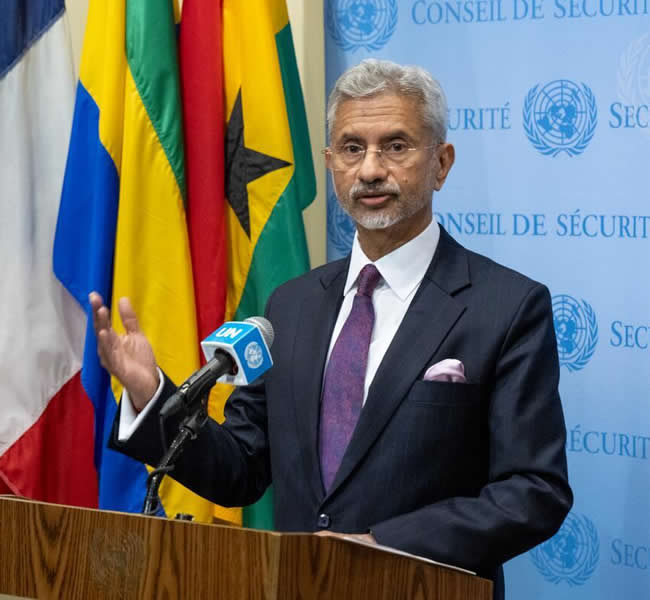
Photo: Subrahmanyam Jaishankar, President of the Security Council for December and External Affairs Minister of India, briefs reporters on a global counter-terrorism approach after the Security Council meeting. December 15, 2022. United States of America. New York. UN Photo/Eskinder Debebe.
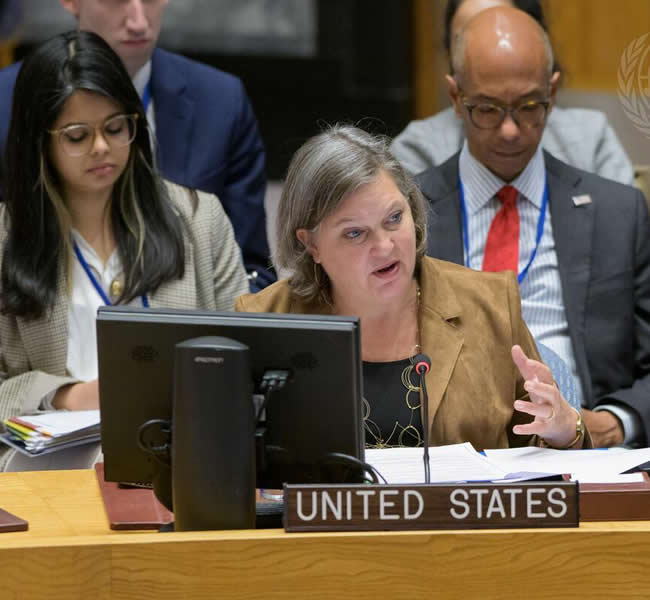
Photo: Victoria Nuland, Under Secretary for Political Affairs of the United States of America, addresses the Security Council meeting on threats to international peace and security caused by terrorist acts. The conference’s focus is “global counter-terrorism approach - principles and the way forward.” December 15, 2022. United States of America. New York. UN Photo/Manuel Elias.
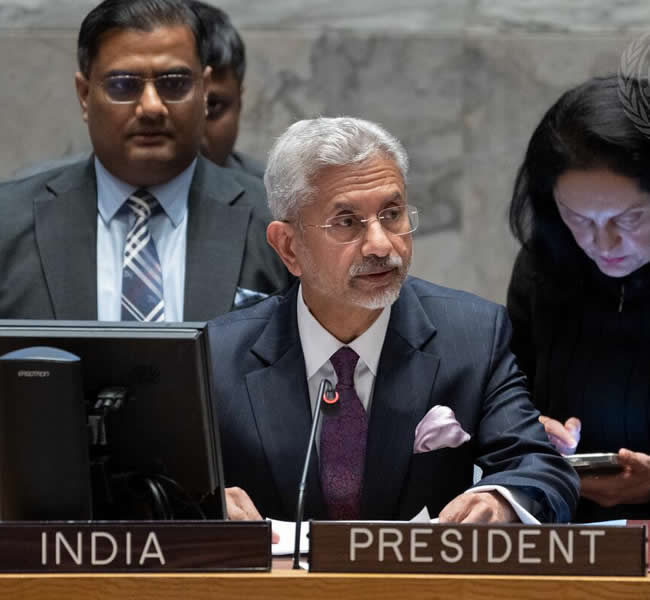
Photo: Subrahmanyam Jaishankar, President of the Security Council for December and External Affairs Minister of India, chairs the Security Council meeting on threats to international peace and security caused by terrorist acts. The forum’s focus is “global counter-terrorism approach - principles and the way forward.” December 15, 2022. United States of America. New York. UN Photo/Eskinder Debebe.
Source: United Nations, New York
|GlobalGiants.Com|







Edited & Posted by the Editor | 11:09 AM | View the original post
December 15, 2022
At the Inauguration Ceremony for Mahatma Gandhi Bust, UN Secretary-General said Peace Leader's Vision was Foundational for United Nations
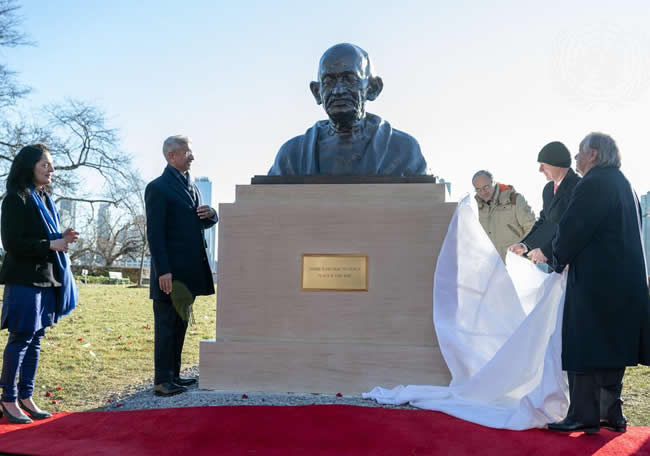

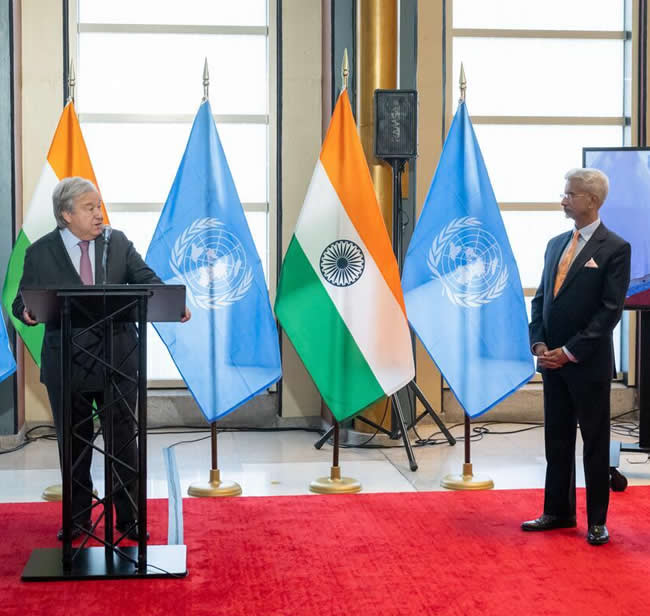
Photos: Ceremony to Unveil Mahatma Gandhi Bust at UN Headquarters, a gift to the United Nations from India. The plaque says, “There is no way to peace; peace is the way.” The event was attended by, among others, the Secretary-General António Guterres, Csaba KÅ‘rösi, President of the seventy-seventh session of the United Nations General Assembly, Ruchira Kamboj, Permanent Representative of India to the United Nations, and Subrahmanyam Jaishankar, External Affairs Minister of India. December 14, 2022. United States of America. New York. Images provided by & copyright © UN Photo/Mark Garten.
New York, December 15, 2022 — Following are UN Secretary-General António Guterres’ remarks at the inauguration ceremony for Mahatma Gandhi’s Bust in New York:
“It’s a great pleasure to join you today to mark the installation of this bust of Mahatma Gandhi. I thank the Government and the Permanent Mission of India for donating this tribute to one of the giants of the modern age.
“My visit to India earlier this year reminded me that there are few people in history so aligned with the goals and values of the United Nations as Mahatma Gandhi.
“Gandhiji’s anti-imperialist vision was foundational for the United Nations. As the Charter states, our Organization is built on the principle of “equal rights and self-determination of peoples .” Indeed, the drafters of the Charter took great inspiration from Gandhi’s message of peace, non-violence, and tolerance.
“Gandhi’s success in mobilizing millions for anti-colonial resistance while adhering to the principles of non-violence inspired people worldwide. But Gandhi is not only a historical figure. His visionary ideas and values, including his concern for justice and social transformation, continue to resonate today.
“Many of his ideas prefigured the concept of sustainable development — including his view that “poverty is the worst form of violence .” Likewise, his belief that societies should be judged on their record of uplifting the most vulnerable holds important lessons for today’s leaders.
“Gandhi was one of the first to recognize the dangers of the plunder and destruction of our environment, observing that the earth, the air, the land, and the water are not an inheritance from our forefathers but on loan from our children. He was a famous supporter of sustainable local products like khadi - India’s homespun cotton.
“He championed women in politics and rejected discriminatory practices. Gandhi was an uncompromising advocate for peaceful coexistence, non-discrimination, and pluralism. Recognizing that diversity is one of India’s greatest assets, he strove for harmonious relations between religions, cultures, and communities.
“The focus of his life was pressing for social and political reform through non-violent resistance while creating a culture of peace. His legacy is everywhere, including in the daily work of the United Nations worldwide for equality, solidarity, and empowerment.
“Once again, I thank the Government of India for its generous donation of this bust. I hope its installation here at the Headquarters of the United Nations will remind us of the values Gandhi upheld and to which we remain committed.”
Source: United Nations, New York
|GlobalGiants.Com|







Edited & Posted by the Editor | 12:22 PM | View the original post
December 14, 2022
Finance & Central Bank Deputies Meeting under the G20 Presidency of India, Bengaluru (December 13-15, 2022)
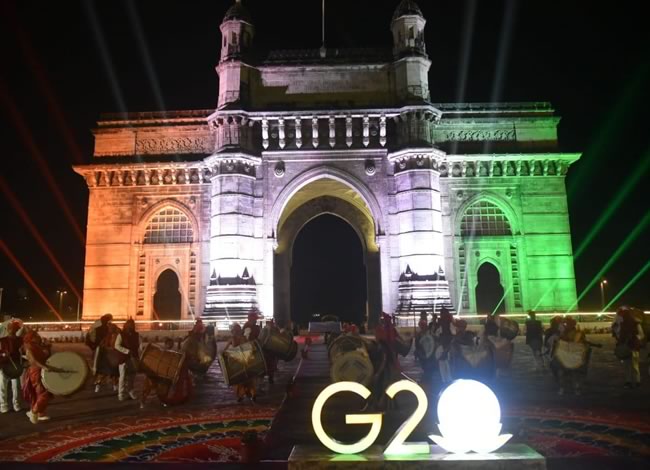
Photo: Gateway of India, Mumbai, illuminated to welcome G20 delegates to Mumbai. Image provided by G20 India.
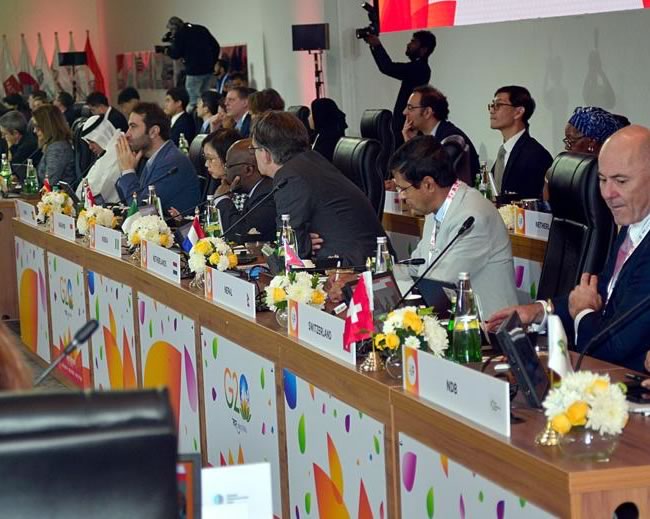
Photo: A view of the G20 Finance & Central Bank Deputies Meeting in Bangaluru, India, December 14, 2022. Image provided by G20 India.
Bengaluru, India, December 14, 2022 — The first G20 Finance and Central Bank Deputies (FCBD) meeting is taking place 13-15 December 2022 in Bengaluru. This meeting, which marks the start of discussions on the Finance Track agenda under the Indian G20 Presidency, is hosted jointly by the Ministry of Finance and the Reserve Bank of India.
The G20 Finance Track, led by Finance Ministers and Central Bank Governors of G20 countries, focuses on economic and financial issues. It provides an effective forum for global economic discourse and policy coordination. The First Finance Ministers and Central Bank Governors Meeting will be held during 23-25 February 2023 in Bengaluru.
Prime Minister Modi said in his address at the Bali G20 Summit that the need today is that the benefits of development are universal and all-inclusive. Ministry of Finance, India, has imbibed this idea in the G20 Finance Track agenda.
Mr. Ajay Seth, Secretary Department of Economic Affairs, and Dr. Michael D. Patra, Deputy Governor of the Reserve Bank of India, are co-chairing the G20 Finance and Central Bank Deputies meeting. Their counterparts from G20 member countries and several other countries and international organizations invited by India are participating in the two-day conference.
The G20 Finance Track discusses critical issues of relevance for the global economy, encompassing the global economic outlook, the international financial architecture, infrastructure development and financing, sustainable finance, global health, international taxation, and financial sector issues, including financial inclusion.
On the sidelines of the meeting, a panel discussion took place on ‘Strengthening Multilateral Development Banks to Address Shared Global Challenges of the 21st Century. In addition, a seminar on the ‘Role of Central Banks in Green Financing’ took place.
The Indian G20 Presidency’s theme of ‘One Earth, One Family, One Future’ will guide the G0 Finance Track discussions. Approximately 40 meetings of the Finance Track will take place in several locations in India, which include arrangements of G20 Finance Ministers and Central Bank Governors.
India has assumed the G20 Presidency at a time of multiple challenges, which include scarring from the COVID-19 pandemic, sharpened geopolitical tensions, rising food and energy security concerns, growing debt distress, inflationary pressures, and monetary tightening, among others. Hence, a vital role of the G20 is to guide in dealing with such challenges.
During India’s G20 Presidency, supporting the countries most in need and reflecting the concerns and aspirations of developing countries will be at the forefront of the G20’s efforts. The Ministry of Finance and the Reserve Bank of India will steer the G20 Finance Track agenda in an inclusive manner aimed at addressing the global economy needs of today as well as preparing for a better tomorrow.
Source: G20 India
|GlobalGiants.Com|







Edited & Posted by the Editor | 9:29 AM | View the original post
December 10, 2022
At UNESCO, World Education Leaders call for Environment Education and Digital Access to be part of Learning for All.
— The High-Level Steering Committee on Sustainable Development Goal 4 on Education, convened by UNESCO, called on countries to adopt new indicators measuring the implementation of green Education and digital access to learning for all.
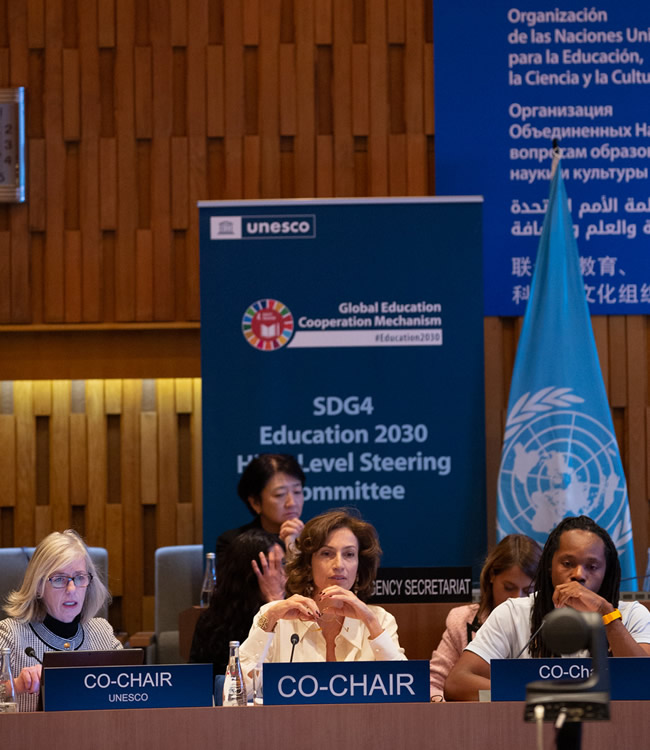
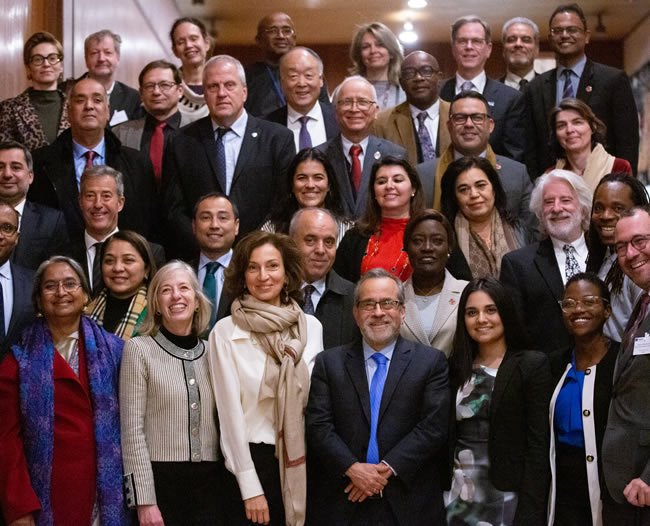
Photos: UNESCO Headquarters Paris. SDG4 High-Level Steering Committee Meeting. December 9, 2022. Images provided by & copyright © UNESCO/Christelle ALIX.
Paris, December 09, 2022 — To advance its priorities, on December 8 & 9, UNESCO convened a meeting of the High-Level Steering Committee on Sustainable Development Goal 4 on Education. The meeting took place at UNESCO Headquarters, under the chairmanship of Audrey Azoulay, UNESCO’s Director General, and Julius Maada Bio, the President of Sierra Leone.
Following the Transforming Education Summit (TES) on September 2022 in New York, the UN Secretary-General mandated the Committee to ensure and monitor the effective follow-up of countries’ commitments at the Summit.
The Committee called on world leaders to endorse the six calls to action at the Summit:
- The green and digital transitions
- Advancing gender equality
- Foundational learning
- Education in crisis contexts
- Equitable and efficient education financing
“Ensuring all children and youth are climate-ready, improving schools’ digital connectivity and students’ access to online learning contents are critical goals. We appeal to world leaders to accelerate progress in these areas following the agreements reached by the Transforming Education Summit,” UNESCO Director-General Audrey Azoulay said.
The Sustainable Development Goal benchmarks will measure each country’s progress by 2025 and 2030, representing the transformation countries want to see from the Summit. For example, governments could count how many schools are green-accredited and how much national laws, policies, and standards cover climate education. On digital transformation, countries could measure the extent to which every school and child is connected to digital solutions.
The High-Level Steering Committee (HLSC) comprises principals of United Nations and education partner agencies, civil society and donor representatives, and Ministers of Education from 12 countries.
HLSC follows the Transforming Education Summit (TES) that took place in September 2022 in New York. TES was the largest global education summit in recent decades. It led to national commitments from 133 countries to recover learning losses from the pandemic and transform their education systems to make them more inclusive, relevant, and resilient to future shocks.
Source: UNESCO
|GlobalGiants.Com|
— The editor is a UNESCO—IIEP readied “Independent Appraiser” of Government Education Plans.







Edited & Posted by the Editor | 3:20 PM | View the original post
October 17, 2022
International Monetary Fund Financial Committee Press Briefing
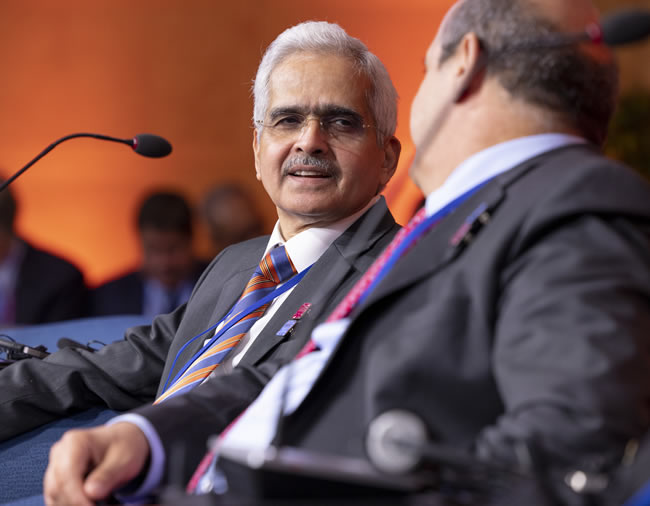
Photo: The Governor, Reserve Bank of India, Shaktikanta Das, confers with another Central Bank Governor during IMFC Restricted Early Warning Exercise Meeting in Washington, DC. IMF Managing Director Kristalina Georgieva, First Deputy Managing Director Gita Gopinath, Deputy Managing Director Bo Li, and Deputy Managing Director Kenji Okamura also participated in the International Monetary and Financial Committee Restricted Early Warning Exercise during the 2022 Annual Meetings at the International Monetary Fund. October 13, 2022. Washington, DC, United States. IMF Photo/Allison Shelley.
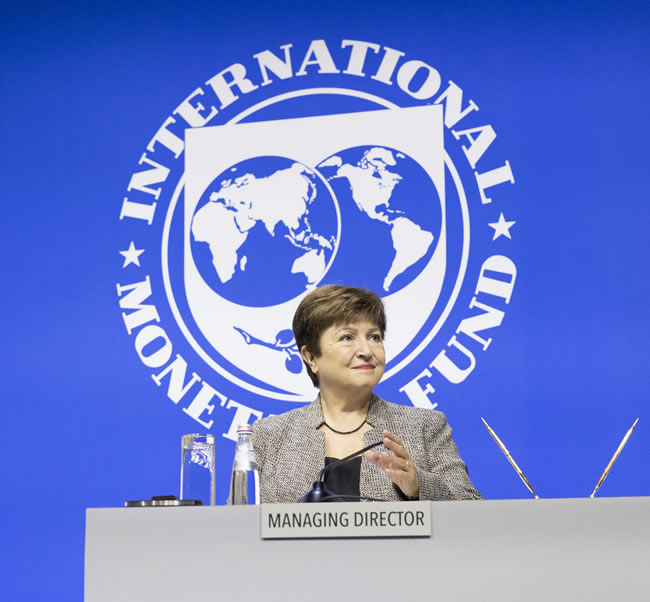
Photo: IMF Managing Director Kristalina Georgieva takes her seat before the Annual Meetings Plenary at the International Monetary Fund. October 14, 2022. Washington, DC, United States. IMF Photo/Allison Shelley.
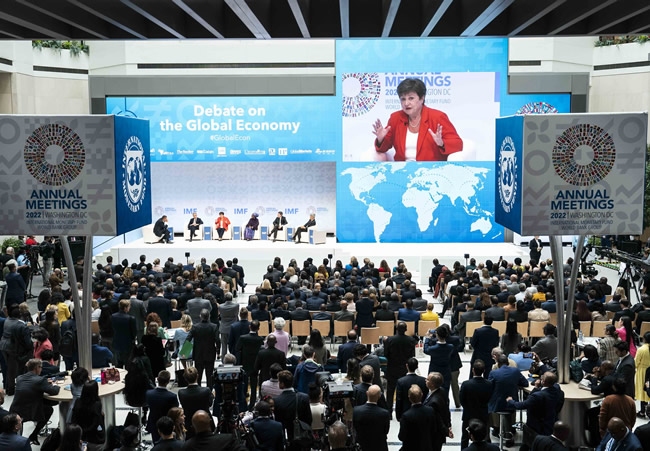
Photo: IMF Managing Director Kristalina Georgieva participates in the Debate on Global Economy Seminar during the 2022 Annual Meetings at the International Monetary Fund. October 13, 2022. Washington, DC, United States. IMF Photo/Joshua Roberts.
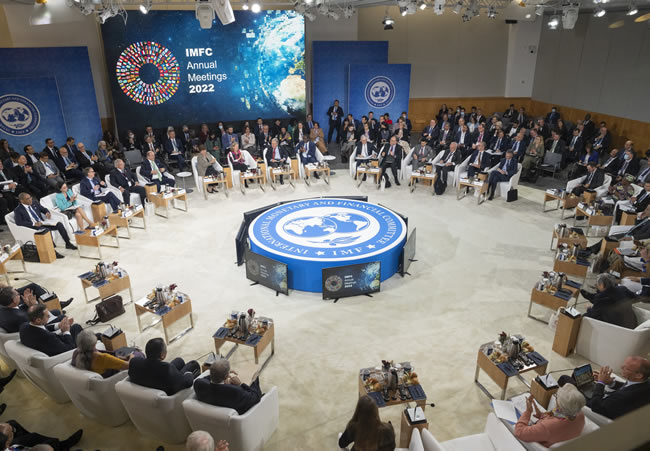
Photo: IMF Managing Director Kristalina Georgieva, First Vice President of Spain and IMFC Chair Nadia Calvino, and Secretary General of the United Nations, António Guterres, participate in the IMFC Plenary Session during the 2022 Annual Meetings at the International Monetary Fund. October 14, 2022. Washington, DC, United States. IMF Photo/Cory Hancock.
Washington, DC, October 15, 2022 — International Monetary Fund Financial Committee (IMFC) Chair Nadia Calvino and IMF Managing Director Kristalina Georgieva summarized the outcome of the 46th IMFC at the 2022 IMF-World Bank Annual Meetings.
IMF Managing Director Kristalina Georgieva said that the message from the IMF is clear.
We recognize that we need to do more, especially in debt. So meeting participants are urging the IMF to forcefully step forward with possible solutions to bring more impactful needs to the standard framework. They are also asking to proactively work for the creditors and debtors to seek an early resolution to the problems for which we need clear guidelines. We need more predictability, and we need fair treatment of all creditors, public and private. Finally, I want to finish by saying what I said in the end. We were running out of time, and you turned to me and said, How would you sum up this meeting? And my summing up was to buckle up and keep going. And this is what we intend to do, said Georgieva.
IMF Managing Director Kristalina Georgieva called for an end to Russia’s war on Ukraine.
“On a very human, practical, and objective level. Stop the war. Stop the war. I’m looking at this audience. Wouldn’t you think this is the most straightforward way to get the world economy in better shape? Stop the war,” said Georgieva.
IMFC Chair Nadia Calvino highlighted the global economic situation as a factor in the growth of far-right extremism.
“The current environment is one of slowing down growth, high cost of living or increasing cost of living in many parts of the world. But, in addition, big changes involve digitalization, climate change, geopolitical shift, and rising inequality in many of our countries. And this is an environment which is quite open to the messages of people that have elementary and ineffective and wrong solutions to complex matters,” said Calvino.
Source: IMF (International Monetary Fund)
|GlobalGiants.Com|
— The editor is a Financial Market Analyst qualified from the International Monetary Fund Institute for Capacity Development, Washington, DC.







Edited & Posted by the Editor | 4:54 AM | View the original post







